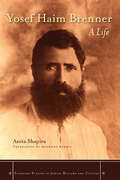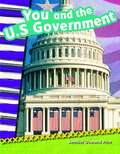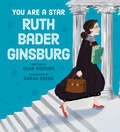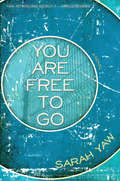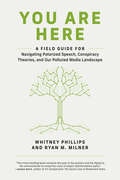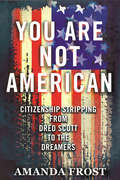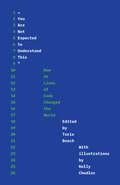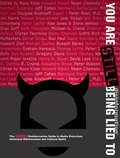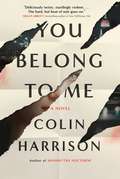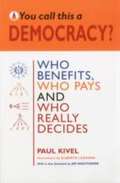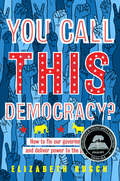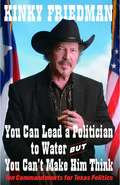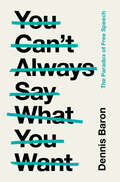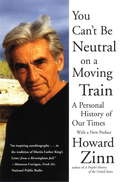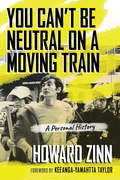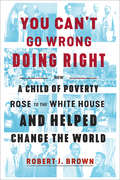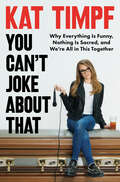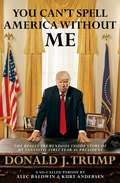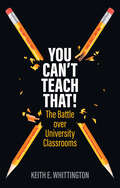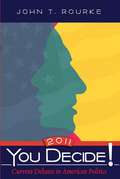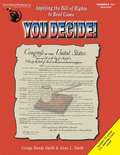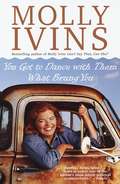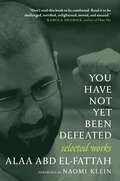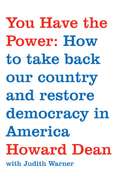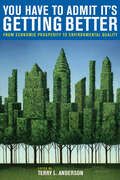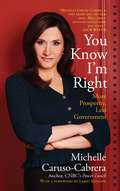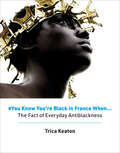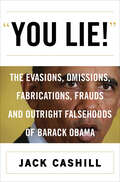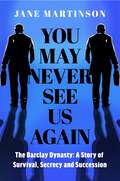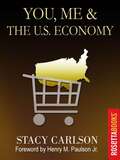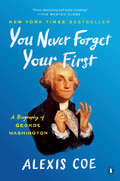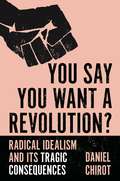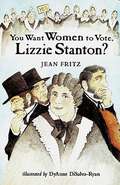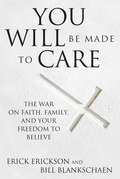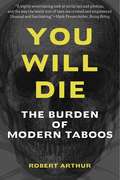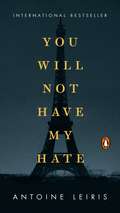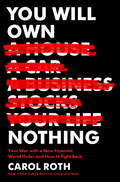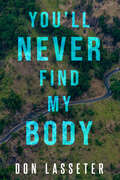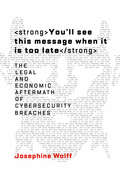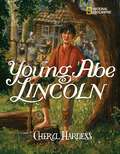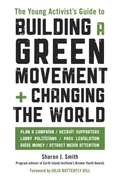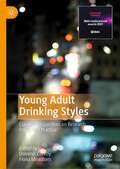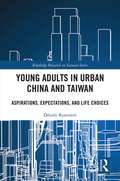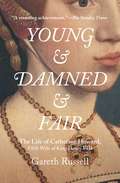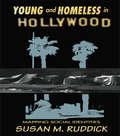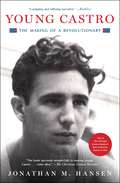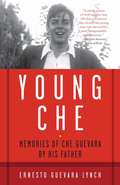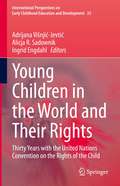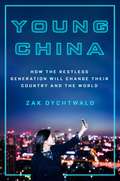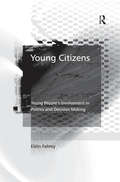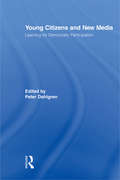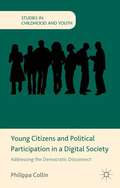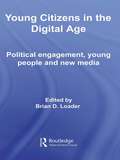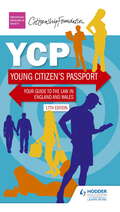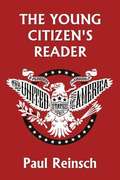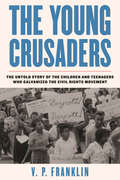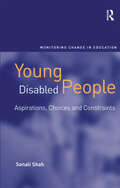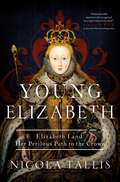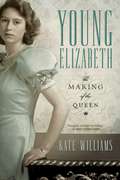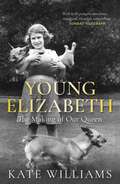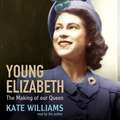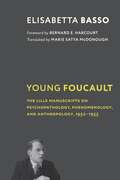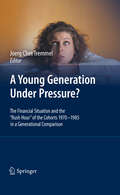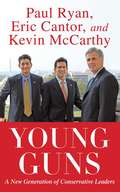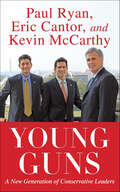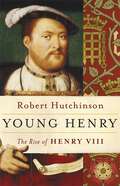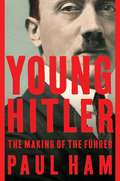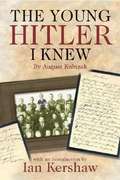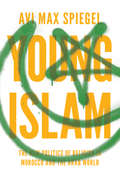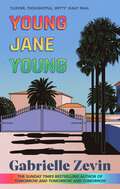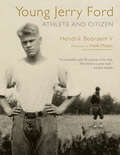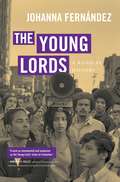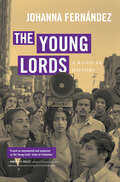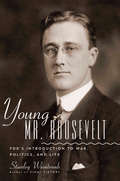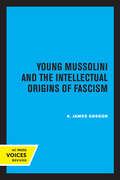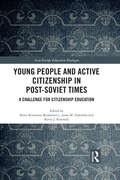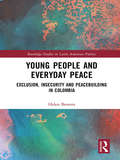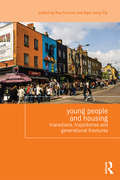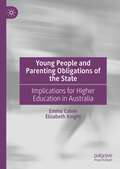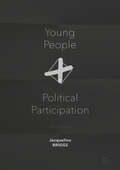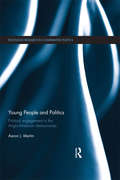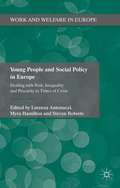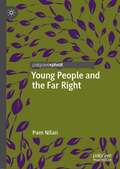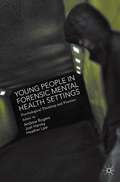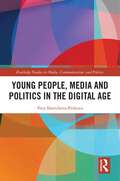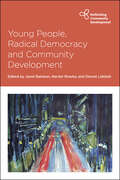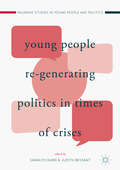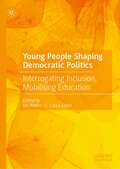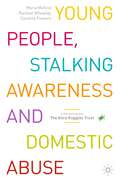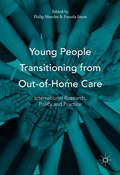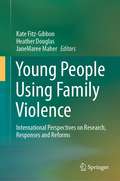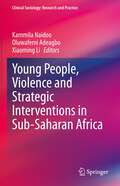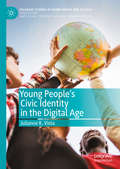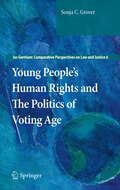- Table View
- List View
Yosef Haim Brenner: A Life
by translated by Anthony Berris Anita ShapiraBased on previously unexploited primary sources, this is the first comprehensive biography of Yosef Haim Brenner, one of the pioneers of Modern Hebrew literature. Born in 1881 to a poor Jewish family in Russia, Brenner published his first story, "A Loaf of Bread," in 1900. After being drafted into the Russian army, he deserted to England and later immigrated to Palestine where he became an eminent writer, critic and cultural icon of the Jewish and Zionist cultural milieu. His life was tragically ended in the violent 1921 Jaffa riots. In a nutshell, Brenner's life story encompasses the generation that made "the great leap" from Imperial Russia's Pale of Settlement to the metropolitan centers of modernity, and from traditional Jewish beliefs and way of life to secularism and existentialism. In his writing he experimented with language and form, but always attempting to portray life realistically. A highly acerbic critic of Jewish society, Brenner was relentless in portraying the vices of both Jewish public life and individual Jews. Most of his contemporaries not only accepted his critique, but admired him for his forthrightness and took it as evidence of his honesty and veracity. Renowned author and historian Anita Shapira's new biography illuminates Brenner's life and times, and his relationships with leading cultural leaders such as Nobel laureate S. Y. Agnon, Hayim Nahman Bialik, Israel's National Poet, and many others. Undermining the accepted myths about his life and his death, his depression, his relations with writers, women, and men#151;including the question of his homoeroticism#151;this new biography examines Brenner's life in all its complexity and contradiction.
You And The U. S. Government (Social Studies: Informational Text Ser.)
by Jennifer Overend PriorThis informative book teaches early readers about the important impact the government has on our lives. Readers will learn about taxes, the three branches of government, voting, and more through bright images and supportive text. A table of contents, glossary, and index are included to aid in helping readers better understand the content.
You Are a Star, Ruth Bader Ginsburg
by Dean RobbinsMake way for Ruth Bader Ginsburg!It's RBG like you've never seen her before!Using a unique mix of first-person narrative, hilarious comic panels, and essential facts, Dean Robbins introduces young readers to an American trailblazer. The first book in an exciting new nonfiction series, You Are a Star, Ruth Bader Ginsburg focuses on Ruth's lifelong mission to bring equality and justice to all. Sarah Green's spot-on comic illustrations bring this icon to life, and engaging backmatter instructs readers on how to be more like Ruth!
You Are Free to Go
by Sarah YawWinner of the 2013 Engine Books Novel Prize.Moses and Jorge will never leave the maximum security prison. Outside its walls, Gina, Shell, and Ellen will never escape its influence, or the way it tethers them to one another. When Jorge dies in his cell, lives within and beyond the prison walls are upended, testing the boundaries we all draw to keep the good in, the hurtful out.Sarah Yaw received an MFA in fiction from Sarah Lawrence College and is an assistant professor at Cayuga Community College. She lives and writes in central New York.
You Are Here: A Field Guide for Navigating Polarized Speech, Conspiracy Theories, and Our Polluted Media Landscape
by Whitney Phillips Ryan M. MilnerHow to understand a media environment in crisis, and how to make things better by approaching information ecologically.Our media environment is in crisis. Polarization is rampant. Polluted information floods social media. Even our best efforts to help clean up can backfire, sending toxins roaring across the landscape. In You Are Here, Whitney Phillips and Ryan Milner offer strategies for navigating increasingly treacherous information flows. Using ecological metaphors, they emphasize how our individual me is entwined within a much larger we, and how everyone fits within an ever-shifting network map.
You Are Not American: Citizenship Stripping from Dred Scott to the Dreamers
by Amanda FrostCitizenship is invaluable, yet our status as citizens is always at risk--even for those born on US soil.Over the last two centuries, the US government has revoked citizenship to cast out its unwanted, suppress dissent, and deny civil rights to all considered "un-American"--whether due to their race, ethnicity, marriage partner, or beliefs. Drawing on the narratives of those who have struggled to be treated as full members of "We the People," law professor Amanda Frost exposes a hidden history of discrimination and xenophobia that continues to this day. The Supreme Court's rejection of Black citizenship in Dred Scott was among the first and most notorious examples of citizenship stripping, but the phenomenon did not end there. Women who married noncitizens, persecuted racial groups, labor leaders, and political activists were all denied their citizenship, and sometimes deported, by a government that wanted to redefine the meaning of "American." Today, US citizens living near the southern border are regularly denied passports, thousands are detained and deported by mistake, and the Trump administration is investigating the citizenship of 700,000 naturalized citizens. Even elected leaders such as Barack Obama and Kamala Harris are not immune from false claims that they are not citizens eligible to hold office.You Are Not American grapples with what it means to be American and the issues surrounding membership, identity, belonging, and exclusion that still occupy and divide the nation in the twenty-first century.
"You Are Not Expected to Understand This": How 26 Lines of Code Changed the World
by Kelly ChudlerLeading technologists, historians, and journalists reveal the stories behind the computer coding that touches all aspects of life—for better or worseFew of us give much thought to computer code or how it comes to be. The very word “code” makes it sound immutable or even inevitable. “You Are Not Expected to Understand This” demonstrates that, far from being preordained, computer code is the result of very human decisions, ones we all live with when we use social media, take photos, drive our cars, and engage in a host of other activities.Everything from law enforcement to space exploration relies on code written by people who, at the time, made choices and assumptions that would have long-lasting, profound implications for society. Torie Bosch brings together many of today’s leading technology experts to provide new perspectives on the code that shapes our lives. Contributors discuss a host of topics, such as how university databases were programmed long ago to accept only two genders, what the person who programmed the very first pop-up ad was thinking at the time, the first computer worm, the Bitcoin white paper, and perhaps the most famous seven words in Unix history: “You are not expected to understand this.”This compelling book tells the human stories behind programming, enabling those of us who don’t think much about code to recognize its importance, and those who work with it every day to better understand the long-term effects of the decisions they make.With an introduction by Ellen Ullman and contributions by Mahsa Alimardani, Elena Botella, Meredith Broussard, David Cassel, Arthur Daemmrich, Charles Duan, Quinn DuPont, Claire L. Evans, Hany Farid, James Grimmelmann, Katie Hafner, Susan C. Herring, Syeda Gulshan Ferdous Jana, Lowen Liu, John MacCormick, Brian McCullough, Charlton McIlwain, Lily Hay Newman, Margaret O’Mara, Will Oremus, Nick Partridge, Benjamin Pope, Joy Lisi Rankin, Afsaneh Rigot, Ellen R. Stofan, Lee Vinsel, Josephine Wolff, and Ethan Zuckerman.
You Are Still Being Lied To: The New Disinformation Guide to Media Distortion, Historical Whitewashes and Cultural Myths (Disinformation Books)
by Russ KickA must-have revised and expanded edition of The Disinformation Companys classic anthology, You Are STILL Being Lied To contains more than a dozen all-new essays from contributors like Norman Solomon, Graham Hancock, Alex Jones, John Major Jenkins, Robert Bauval, Richard DeGrandpre, Alexandra Bruce,John Hogue, Gregory Davis, and Scott Creighton on topics ranging from the misleading marketing of antidepressants to the truth about the North American Union, from media consolidation to the New Thought movement.Editor Russ Kicks massive collection acts as a battering ram against the distortions, myths, and outright lies that have been shoved down our throats by the government, the media, corporations, organized religion, the scientific establishment, and others who want to keep the truth from us.An unprecedented group of researchers including Howard Zinn, Noam Chomsky, Howard Bloom, Sydney Schanberg, Michael Parenti, Riane Eisler, Jim Marrs, and many, many others paint a picture of a world where crucial stories are ignored or actively suppressed and the official version of events has more holes in it than Swiss cheese. A world where real dangers are downplayed and nonexistent dangers are trumpeted. In short, a world where you are being lied to.
You Belong to Me
by Dr Colin HarrisonIn this action-packed thriller, a mysterious man from a woman’s past suddenly returns, raising the suspicions of her influential husband—and setting off a series of alarming events.Paul Reeves is an immigration lawyer whose true obsession is collecting maps of New York City, an art form made all the more precious by an increasingly digital world. One day, he abandons work to attend an auction with his neighbor, Jennifer Mehraz, the beautiful young wife of an ambitious Iranian financier, hoping to acquire an unusual map. Midway through the auction, though, a handsome man in fatigues turns up, and Jennifer abandons Paul without a word, leaving him so distracted he almost misses his chance at the map he’s long coveted. The man’s appearance triggers increasingly unfortunate incidents, as the people surrounding Jennifer—including her jealous husband, who is eyeing a career in politics—attempt to figure out who the mysterious stranger is. But Jennifer isn’t talking. Despite Paul’s growing concerns, when he is informed that one of the world’s rarest maps is up for sale, all his thoughts turn to securing it. But will the illicit goings-on across the hall interfere with the biggest deal of his life?
You Call This a Democracy?: Who Benefits, Who Pays, Who Really Decides?
by Paul KivelA penetrating look at the U. S. ruling class - a rich and powerful portion of the population who own tremendous amounts of wealth and who benefit from the way that decisions get made in this country. A look as well at an even smaller group, the power elite - 7,000 to 10,000 (predominately) white men - who make many of the decisions that affect our everyday lives. Most of the time they decide, they and the ruling class benefit, and we pay in our wages, our taxes, our health, the quality of our housing, and often with our lives. The book is carefully researched and referenced, and filled with numerous examples and illustrations. It is an indispensable resource for every person concerned about the undemocratic concentration of wealth and power in our society. Book jacket.
You Call This Democracy?: How to Fix Our Government and Deliver Power to the People
by Elizabeth RuschAmerica is the greatest democracy in the world . . . isn't it? Author Elizabeth Rusch examines some of the more problematic aspects of our government but, more importantly, offers ways for young people to fix them. The political landscape has never been so tumultuous: issues with the electoral college, gerrymandering, voter suppression, and a lack of representation in the polls and in our leadership have led to Americans of all ages asking, How did we get here? The power to change lies with the citizens of this great country—especially teens! Rather than pointing fingers at people and political parties, You Call This Democracy? looks at flaws in the system—and offers a real way out of the mess we are in. Each chapter breaks down a different problem plaguing American democracy, exploring how it&’s undemocratic, offering possible solutions (with examples of real-life teens who have already started working toward them), and suggesting ways to effect change—starting NOW!
You Can Fool All of the People All the Time
by Art BuchwaldA collection of humorous columns many of which deal with Ronald Reagan and his presidency, by the famous wit.
You Can Lead a Politician to Water, But You Can't Make Him Think
by Kinky FriedmanAnd Kinky Said Unto the People: Why the Hell Not? So the good people of Texas weren't able to get the Kinkster into the Governor's Mansion in 2006. It was a solid race, and he fought the good fight. Getting on the ballot as an independent -- a feat that had not been achieved in over a century -- was a victory in itself. And with ideas like "slots for tots" (legalized gambling to pay for education), the five Mexican generals plan (bribes to enforce border protection), and a firm stand against the "wussification" of the state, he would have done a helluva job. If that 2006 election was any indication -- and it was -- the political landscape in both Texas and the country at large needs a significant overhaul. The hucksters, the wealthy, and the twofaced rule; there is no room for Truth, and the little guys are quickly forgotten in all the muck. But Kinky, (briefly) down yet certainly not out, is still looking out for his fellow Americans, and he has much wisdom to impart. In this hilarious, thought-provoking manifesto, Kinky lays forth his ten commandments for improving the state of Texas and politics everywhere, and for restoring order, logic, decency, and above all a sense of humor back to this country. It's classic Kinky in a brand new way. And he might just have a point.
You Can't Always Say What You Want: The Paradox of Free Speech
by Dennis BaronThe freedom to think what you want and to say what you think has always generated a pushback of regulation and censorship. This raises the thorny question: to what extent does free speech actually endanger speech protection? This book examines today's calls for speech legislation and places it into historical perspective, using fascinating examples from the past 200 years, to explain the historical context of laws regulating speech. Over time, the freedom to speak has grown, the ways in which we communicate have evolved due to technology, and our ideas about speech protection have been challenged as a result. Now more than ever, we are living in a free speech paradox: powerful speakers weaponize their rights in order to silence those less-powerful speakers who oppose them. By understanding how this situation has developed, we can stand up to these threats to the freedom of speech.
You Can't Be Neutral on a Moving Train
by Howard ZinnBeacon Press is proud to publish a new edition of the classic memoir by one of our most lively, influential, and engaged teachers and activists. Howard Zinn, author of A People's History of the United States, tells his personal stories about more than thirty years of fighting for social change, from teaching at Spelman College to recent protests against war.A former bombardier in WWII, Zinn emerged in the civil rights movement as a powerful voice for justice. Although he's a fierce critic, he gives us reason to hope that by learning from history and engaging politically, we can make a difference in the world.
You Can't Be Neutral on a Moving Train: A Personal History
by Howard Zinn Keeanga-Yamahtta TaylorHoward Zinn, author of A People's History of the United States, tells his personal stories about more than thirty years of fighting for social change, from teaching at Spelman College to recent protests against war.A former bombardier in WWII, Zinn emerged in the civil rights movement as a powerful voice for justice. Although he's a fierce critic, he gives us reason to hope that by learning from history and engaging politically, we can make a difference in the world.
You Can't Go Wrong Doing Right: How a Child of Poverty Rose to the White House and Helped Change the World
by Robert J. BrownAn unforgettable account of a quietly remarkable life, Robert Brown's memoir takes readers behind the scenes of pivotal moments from the 20th century, where the lessons he learned at his grandmother's knee helped him shape America as we know it today. Called "a world-class power broker" by the Washington Post, Robert Brown has been a sought-after counselor for an impressive array of the famous and powerful, including every American president since John F. Kennedy. But as a child born into poverty in the 1930s, Robert was raised by his grandmother to think differently about success. For example, "The best way to influence others is to be helpful," she told him. And, "You can’t go wrong by doing right." Fueled by these lessons on humble, principled service, Brown went on to play a pivotal, mostly unseen role alongside the great and the powerful of our time: trailing the mob in 1950s Harlem with a young Robert F. Kennedy; helping the white corporate leadership at Woolworth integrate their lunch counters; channeling money from American businesses to the Civil Rights movement; accompanying Coretta Scott King, at her request, to Memphis the day after her husband had been shot; advising Richard Nixon on how to support black entrepreneurship; becoming the only person allowed to visit Nelson Mandela in Pollsmoor prison in Cape Town. Full of unbelievable moments and reminders that the path to influence runs through a life of generosity, YOU CAN'T GO WRONG DOING RIGHT blends a heartwarming, historically fascinating account with memorable lessons that will speak to the dreamer in all of us.
You Can't Joke About That: Why Everything Is Funny, Nothing Is Sacred, and We're All in This Together
by Kat TimpfWhat happens when we can’t joke about some of the most important stuff in life? <p><p>In a 2019 study, 40% of people reported censoring themselves out of fear that voicing their views would alienate them from the people they care about most. Those people should probably not read this book in public. <p><p>In You Can’t Joke About That, Kat Timpf shows why much of the way we talk about sensitive subjects is wrong. We’ve created all the wrong rules. We push ourselves into unnecessary conflicts when we should feel like we’re all in this together. When someone says “you can’t joke about that,” what they really mean is “this is a subject that makes people sad or angry.” <p><p>Hilariously and movingly, Timpf argues that those subjects are actually the most important to joke about. She shows us we can find healing through humor regarding things you probably don't want to bring up in polite conversation, like traumatic break-ups, cancer, being broke, Dave Chappelle, rape jokes, aging, ostomy bags, religion, body image, dead moms, religion, the lab leak theory, transgender swimmers, gushing wounds, campus censorship, and bad Christmas presents. <p><p>This book is Kat Timpf with her hair down, except since hers is mostly extensions, this book is Kat Timpf with her hair out. Read it because you want to get to know her better. Read it because it’s the best book on free speech and comedy in a generation. Read it because you want to laugh out loud… even at the kind of stuff we’re afraid to say out loud. Just read it, and you’ll be glad you did. <p> <b>New York Times Bestseller</b>
You Can't Spell America Without Me: The Really Tremendous Inside Story of My Fantastic First Year as President Donald J. Trump (A So-Called Parody)
by Kurt Andersen Alec Baldwin<P>Political satire as deeper truth: Donald Trump’s presidential memoir, as recorded by two world-renowned Trump scholars, and experts on greatness generally <P>"I have the best words, beautiful words, as everybody has been talking and talking about for a long time. Also? The best sentences and, what do you call them, paragraphs. My previous books were great and sold extremely, unbelievably well--even the ones by dishonest, disgusting so-called journalists. But those writers didn't understand Trump, because quite frankly they were major losers. People say if you want it done right you have to do it yourself, even when 'it' is a 'memoir.' So every word of this book was written by me, using a special advanced word processing system during the many, many nights I've been forced to stay alone in the White House--only me, just me, trust me, nobody helped. And it's all 100% true, so true--people are already saying it may be the truest book ever published. Enjoy." <P>Until Donald Trump publishes the ultimate account of his entire four or eight or one-and-a-half years in the White House, the definitive chronicle will be You Can’t Spell America Without Me: The Really Tremendous Inside Story of My Fantastic First Year As President. Trump was elected because he was the most frank presidential candidate in history, a man eager to tell the unvarnished truth about others’ flaws and tout his own amazing excellence. Now he levels his refreshingly compulsive, un-PC candor at his landslide election victory as well as his role as commander-in-chief and leader of the free world. <P>There are intimate, powerful, mind-boggling revelations on every page. You are there with him during his private encounters with world leaders, a few of whom he does not insult. You are there at the genius Oval Office strategy sessions with his advisers. You are there in his White House bedroom as he crafts the pre-dawn Twitter pronouncements that rock the world. And, of course, you are there on the golf course as Trump attempts to manage the burdens of his office. <P>President Trump explains each of the historic decisions that have already made America great again, and how he always triumphs over the fake news media. You'll learn what he really thinks of his cabinet members and top aides not related to him, of the First Lady and the First Daughter and the additional three or four Trump children. Included at no extra charge is a lavish and exclusive portfolio of spectacular, historic and intimate color photographs of President Trump in private – inside the White House, inside Mar-a-Lago, at Trump Tower, and more. You Can’t Spell America Without Me is presented by America’s foremost Trump scholar Kurt Andersen as well as America's foremost mediocre Trump impersonator, Alec Baldwin.
You Can't Teach That!: The Battle over University Classrooms
by Keith E. WhittingtonWho controls what is taught in American universities – professors or politicians? The answer is far from clear but suddenly urgent. Unprecedented efforts are now underway to restrict what ideas can be promoted and discussed in university classrooms. Professors at public universities have long assumed that their freedom to teach is unassailable and that there were firm constitutional protections shielding them from political interventions. Those assumptions might always have been more hopeful than sound. A battle over the control of the university classroom is now brewing, and the courts will be called upon to establish clearer guidelines as to what – if any – limits legislatures might have in dictating what is taught in public universities. In this path-breaking book, Keith Whittington argues that the First Amendment imposes meaningful limits on how government officials can restrict the ideas discussed on university campuses. In clear and accessible prose, he illuminates the legal status of academic freedom in the United States and shows how existing constitutional doctrine can be deployed to protect unbridled free inquiry.
You Decide! 2011: Current Debates in American Politics
by John T. RourkeEach year this best-selling, debate-style reader examines the most timely, important, and provocative issues in American politics. You Decide! Current Debates in American Politics, 8th edition draws the reader into the key topics that have made headlines and affected our political system during 2010 and will continue to affect our daily lives in 2011. Designed to engage the reader and promote critical thinking about our political system, the topics featured in You Decide!have been selected for their currency, importance, and interest. The pieces, arguing various sides of a given political issue, come from recent journals, congressional hearings, think tanks, and periodicals.
You Decide Applying the Bill of Rights to Real Cases Student Edition
by George Smith Alene L. SmithThis is a middle and high school level textbook using real cases to explain the Bill of Rights.
You Got to Dance with Them What Brung You: Politics in The Clinton Years
by Molly IvinsIt's been five years since Molly Ivins's last book, which is probably too long a time in the opinion of her many fans. But the intervening years have given the bestselling author and syndicated columnist some of the best raw material a political writer could ask for. The Republicans staged a revolution, Clinton was reelected, welfare "deform" swept the country, and the militia movement came out of the bunker: in short, it's been a banner time for Molly's brand of shoot-from-the-hip commentary and uproarious anecdotes. You Got to Dance with Them What Brung You brings together a first-class collection of smart, spirited, and fiercely funny writings. From the wild and woolly politics of her native Texas to the waffling in the Oval Office, Molly exposes the fatuous and hypocritical at all levels of public life. Whether she's writing about the 1996 presidential candidates ("Dole contributed perhaps the funniest line of the year with his immortal observation that tobacco is not addictive but that too much milk might be bad for us. The check from the dairy lobby must have been late that week"), conspiracy theorists ("Twenty-five years in the newspaper bidness have given me a fairly strong faith in the proposition that if you haven't read about it in The Daily Disappointment or seen it on the network news, it's probably not true"), or cultural trends ("I saw a restaurant in Seattle that specialized in latte and barbecue. Barbecue and latte. I came home immediately"), Molly takes on the issues of the day with her trademark good sense and inimitable wit. "I can think of few causes more important than keeping free voices alive in a world of corporate media," Molly writes. She is one of those voices and a national treasure; as the Los Angeles Times put it, she is "H. L. Mencken without the cruelty, Will Rogers with an agenda. " Whatever your political persuasion, you're bound to agree that Molly Ivins is one of the sharpest and most original commentators on the American scene today.
You Have Not Yet Been Defeated: Selected Works 2011-2021
by Alaa Abd el-FattahPowerful ideas of protest and freedom of expression from the world-renowned Egyptian political prisoner and activist collected in English for the first time. With a foreword by Naomi Klein."The text you are holding is living history." — Naomi Klein, from the foreword Alaa Abd el-Fattah is arguably the most high-profile political prisoner in Egypt, if not the Arab world, rising to international prominence during the revolution of 2011. A fiercely independent thinker who fuses politics and technology in powerful prose, an activist whose ideas represent a global generation which has only known struggle against a failing system, a public intellectual with the rare courage to offer personal, painful honesty, Alaa&’s written voice came to symbolize much of what was fresh, inspiring and revolutionary about the uprisings that have defined the last decade. Collected here for the first time in English are a selection of his essays, social media posts and interviews from 2011 until the present. He has spent the majority of those years in prison, where many of these pieces were written. Together, they present not only a unique account from the frontline of a decade of global upheaval, but a catalogue of ideas about other futures those upheavals could yet reveal. From theories on technology and history to profound reflections on the meaning of prison, You Have Not Yet Been Defeated is a book about the importance of ideas, whatever their cost.
You Have the Power
by Howard Dean Judith WarnerIf you are worried about the way America is being governed and want to reclaim the country you know and love, now is the time to take it back. Governor Howard Dean argues that you have the power not just to defeat George W. Bush in this election but to change the future course of America. You Have the Power is an energetic and detailed guide to restoring American democracy. It exposes the radical extremism of today's "mainstream" Republicans and shows Democrats how to be Democrats again. By reigniting hope, by tapping into the energy and ideals of the American people, Dean writes, the Democrats can restore America's strength and standing at home and abroad. Drawing on his experience in the 2004 presidential election and the hope and inspiration of the people he met on the campaign trail, Dean shows how real people -- ordinary Americans like himself -- can come together to take their party, the political process, and their country back.
You Have to Admit It's Getting Better: From Economic Prosperity to Environmental Quality
by Terry L. AndersonContrary to popular belief, economic growth is not the antithesis of environmental quality; rather, the two go hand in hand if the incentives are right. The author shows how, by developing and protecting the institutions of freedom rather than regulating human use of natural resources through political processes, we can have our environmental cake and eat it too.
You Know I'm Right
by Michelle Caruso-CabreraStraight-talking CNBC reporter Michelle Caruso-Cabrera demands a modern solution to our nation's social and economic woes--a return to our political roots: fiscal conservatism, limited government, and personal accountability.Hypocrites and radicals on both sides of the political spectrum have left fiscally conservative, socially liberal Americans like CNBC's Michelle Caruso-Cabrera people without a party. If you tell your neighbors you're a card-carrying Republican, they'll assume you're opposed to abortion, hostile to gay marriage, and don't care about the environment or the poor. Democrats are portrayed as union-loving, tree-hugging activists, more concerned with making government big rather than effective. The reality is that both parties have been hijacked by the wrong issues and have abandoned the loyal Americans who believe that government should stay out of our private lives and out of our pocketbooks.Both parties are to blame for the exorbitant spending and excessive social interference over the last ten years that have left our country in a financial disaster. The core principles of Reaganomics rejuvenated an unstable economy and the Clinton-era policy successes took power away from the federal government and put money in our pockets. We must return to the fundamentals of American politics: small, not big, government. Less spending, not more. The first step is to more narrowly define the parties' platforms away from needlessly divisive social issues and refocus the political discussion on that really matters: economic policies that create jobs.In the smart, tell-it-like-it-is style that has made her popular with Democrats and Republicans like, Caruso-Cabrera outlines forward-thinking free-market solutions for health care, education, and immigration. These ideas will stop our growing deficit, boost our competitive capital, and strengthen our dollar, because an economy that is flexible and free of government interference can grow faster and get the country out of its current malaise. It's not too late to fix our nation, restore our credibility, and rebuild our political system with the tenets on which it was founded: fiscal conservatism and social liberty. Our future is counting on it.
#You Know You're Black in France When: The Fact of Everyday Antiblackness
by Trica KeatonA groundbreaking study about everyday antiblackness and its refusal in an officially raceblind France.What does it mean to be racialized-as-black in France on a daily basis? #You Know You&’re Black in France When… responds to that question. Under the banner of universalism, France messages a powerful and seductive ideology of blindness to race that disappears blackened people and the antiblackness they experience. As Tricia Keaton notes, in everyday life, France is anything but raceblind. In this interdisciplinary study, drawn from a range of critical scholarship including that of Philomena Essed and Frantz Fanon, Keaton illuminates how b/Black (racialized/politicized) French people distinctly expose and refuse what she calls &“raceblind republicanism.&” By officially turning a blind eye to the specificity of antiblackness, the French state in fact perpetuates it, she argues, along with structural racism. Through daily life, public policies, visual culture, the private lives of individuals and families shattered by police violence, the French courts where many are fighting back, and her own experiences, Keaton charts the troubling dynamics and continuities of antiblackness in French society.
"You Lie!": The Evasions, Omissions, Fabrications, Frauds and Outright Falsehoods of Barack Obama
by Jack CashillA devastating catalog of Barack Obama’s numerous evasions, misleading statements and blatant lies, from statements in his national bestseller Dreams from My Father to “You can keep your health plan,” PolitiFact’s 2013 “Lie of the Year.”During President Obama’s address to Congress in November 2009, Representative Joe Wilson of South Carolina shouted, “You lie!” As Jack Cashill details, the president has been lying about his personal history and his political philosophy from the beginning of his political career. Yet throughout his meteoric rise and the first five years of his presidency, the liberal media turned a blind eye to his numerous evasions, contradictions, misstatements, deceptions, untruths, and outright falsehoods.It wasn’t until the disastrous Obamacare rollout that the president’s lies caught up with him. Finally, it was impossible even for the mainstream media to ignore the president’s repeated assertions that all Americans could keep their health care plans and family doctors if they so chose. In You Lie! conservative journalist and author Jack Cashill provides a devastating compendium of the president’s false and misleading statements on matters great and small, from the deliberate distortions in his celebrated memoir, Dreams from My Father, to his rise to the White House and his years as president.
You May Never See Us Again: The Barclay Dynasty: A Story of Survival, Secrecy and Succession
by Jane Martinson'A tour de force' - Guardian'Forensic ... Strong on financial detail' - Financial TimesA Financial Times Book of the Year 2023The untold story of post-war Britain. Told through the lives of the two men who helped shape it: Sir David Barclay and Sir Frederick Barclay.You May Never See Us Again is the only definitive story of David and Frederick Barclay - commonly known as the Barclay brothers. Born poor, these enigmatic twins built one of the biggest fortunes in Britain together from scratch and spent six decades at the epicentre of British business, media and politics. Their empire, said to be worth £7bn at its height, included Littlewoods, the Ritz Hotel, The Daily Telegraph and the channel island of Brecqhou. They were major advocates for Brexit and well-connected with influential politicians including Margaret Thatcher, Boris Johnson and Nigel Farage.And yet despite their fortune and influence, their fiercely guarded desire for privacy has meant that their story remained largely unknown - until a very public family dispute pitched Barclay against Barclay in the High Court.Journalist Jane Martinson unravels the fascinating story of these once inseparable billionaire brothers. Through their lives she offers compelling insights into post-war Britain, from the conditions that enabled their way of doing business to thrive through to the tightly enmeshed webs of influence between capitalism, politics and the media that shape Britain today.
You, Me & The US Economy
by Stacy CarlsonThis groundbreaking title is an insider's account of the 2008 financial crisis written specifically for Main Street. Stacy Carlson, Treasury Secretary Henry Paulson's speechwriter, takes you inside the Treasury Department and explains the events and issues in a wry, personal narrative. You want to understand what brought us to the brink of collapse? After reading You, Me & the U.S. Economy, you will. With clarity and humor, Stacy explains the multiple causes of our financial, housing and economic troubles and the multiple attempts to solve them. She isn't a financial wizard and writes so other non-wizards can understand, too. Wrapped within is her story of faith and persistence in a new, mid-life career and as a silent witness to tremendous turmoil, You, Me & the U.S. Economy tells Main Street what really happened and why. Finally.
You Never Forget Your First: A Biography of George Washington
by Alexis Coe<P><P>Alexis Coe takes a closer look at our first--and finds he is not quite the man we rememberYoung George Washington was raised by a struggling single mother, demanded military promotions, caused an international incident, and never backed down--even when his dysentery got so bad he had to ride with a cushion on his saddle. But after he married Martha, everything changed. Washington became the kind of man who named his dog Sweetlips and hated to leave home. He took up arms against the British only when there was no other way, though he lost more battles than he won. <P><P>After an unlikely victory in the Revolutionary War cast him as the nation's hero, he was desperate to retire, but the founders pressured him into the presidency--twice. When he retired years later, no one talked him out of it. He left the highest office heartbroken over the partisan nightmare his backstabbing cabinet had created. Back on his plantation, the man who fought for liberty must confront his greatest hypocrisy--what to do with the men, women, and children he owns--before he succumbs to death. <P><P>With irresistible style and warm humor, You Never Forget Your First combines rigorous research and lively storytelling that will have readers--including those who thought presidential biographies were just for dads--inhaling every page. <P><P><b>A New York Times Bestseller
You, New Jersey and the World
by John T. CunninghamIntroduces the geography, history, industries, cities, government, and people of "The Garden State."
You Say You Want a Revolution?: Radical Idealism and Its Tragic Consequences
by Daniel ChirotWhy most modern revolutions have ended in bloodshed and failure—and what lessons they hold for today's world of growing extremismWhy have so many of the iconic revolutions of modern times ended in bloody tragedies? And what lessons can be drawn from these failures today, in a world where political extremism is on the rise and rational reform based on moderation and compromise often seems impossible to achieve? In You Say You Want a Revolution?, Daniel Chirot examines a wide range of right- and left-wing revolutions around the world—from the late eighteenth century to today—to provide important new answers to these critical questions.From the French Revolution of the eighteenth century to the Mexican, Russian, German, Chinese, anticolonial, and Iranian revolutions of the twentieth, Chirot finds that moderate solutions to serious social, economic, and political problems were overwhelmed by radical ideologies that promised simpler, drastic remedies. But not all revolutions had this outcome. The American Revolution didn't, although its failure to resolve the problem of slavery eventually led to the Civil War, and the collapse of communism in Eastern Europe was relatively peaceful, except in Yugoslavia. From Japan, North Korea, Vietnam, and Cambodia to Algeria, Angola, Haiti, and Romania, You Say You Want a Revolution? explains why violent radicalism, corruption, and the betrayal of ideals won in so many crucial cases, why it didn't in some others—and what the long-term prospects for major social change are if liberals can't deliver needed reforms.A powerful account of the unintended consequences of revolutionary change, You Say You Want a Revolution? is filled with critically important lessons for today's liberal democracies struggling with new forms of extremism.
You Want Women to Vote, Lizzie Stanton?
by Jean FritzWho says women shouldn't speak in public? And why can't they vote? These are questions Elizabeth Cady Stanton grew up asking herself. Her father believed that girls didn't count as much as boys, and her own husband once got so embarrassed when she spoke at a convention that he left town. Luckily Lizzie wasn't one to let society stop her from fighting for equality for everyone. And though she didn't live long enough to see women get to vote, our entire country benefited from her fight for women's rights. "Fritz?imparts not just a sense of Stanton's accomplishments but a picture of the greater society Stanton strove to change?. Highly entertaining and enlightening. " - Publishers Weekly (starred review) "This objective depiction of AStanton's? life and times?makes readers feel invested in her struggle. " - School Library Journal (starred review) "An accessible, fascinating portrait. " - The Horn Book .
You Will Be Made To Care: The War on Faith, Family, and Your Freedom to Believe
by Erick Erickson Bill BlankschaenReligious liberty is under attack in America. Your freedom to believe may not last much longer. To all those who say they don’t care about the culture war, Erick Erickson has only one response: "The Left will not let you stay on the sidelines. You will be made to care. " <P><P>Now the former Editor-in-Chief of RedState. com joins with Christian author Bill Blankschaen to expose the war in America on Christians and all people of faith who refuse to bow to the worst kind of religion--secularism--one intent on systematically imposing its agenda and frightening doubters into silence. <P><P>The book features first-hand accounts from Christians who've been punished for their beliefs and the perspectives of concerned thought leaders to make the case that Americans of faith can't afford to ignore what's happening--not anymore. <P><P>You Will Be Made to Care offers hope for preserving freedom of conscience with practical steps that believers, families, pastors, church leaders, and citizens can take to resist tyranny and experience a resurgence of faith in America.
You Will Die
by Robert ArthurA book that vigorously defends heroin users and sex workers? In You Will Die: The Burden of Modern Taboos Robert Arthur does that and more to demonstrate that taboos are not relics of primitive societies. America has its own ridiculous phobias and beliefs that cause tedium, suffering, and death. The government and the media use these taboos to lie and mislead. It is not a conspiracy, but by pushing panic for votes and viewers they thwart our pursuit of happiness.You Will Die exposes the fallacies and the history behind our taboos on excrement, sex, drugs, and death. Arthur uses racy readability and rigorous documentation to raze sacred shrines of political correctness on the left and of conventional wisdom on the right. From the proper way to defecate to how to reach nirvana, anticipate the unexpected. It is not simply a novel exploration of sex and drugs, but also of individuality, liberty, and the meaning of life. You Will Die gives readers a new way of seeing their world and allows them to make a more informed choice about living an authentic life.Winner of the 2008 Montaigne Medal awarded for most thought-provoking independent book."... ya gotta fight back against the Sarah Palin 'idiot herd' with something."Wayne Coyne, Lead Singer, The Flaming Lips"... one of my favorite books ..."Mark Frauenfelder, Editor, Boing Boing"This book is a MUST READ! I loved it."Dr. Mark Benn, Psychologist, Colorado State University
You Will Not Have My Hate
by Antoine LeirisINTERNATIONAL BESTSELLER - "On Friday night you stole the life of an exceptional person, the love of my life, the mother of my son, but you will not have my hate." On November 13, 2015, Antoine Leiris's wife, Hélène Muyal-Leiris, was killed by terrorists while attending a rock concert at the Bataclan Theater in Paris, in the deadliest attack on France since World War II. Three days later, Leiris wrote an open letter addressed directly to his wife's killers, which he posted on Facebook. He refused to be cowed or to let his seventeen-month-old son's life be defined by Hélène's murder. He refused to let the killers have their way: "For as long as he lives, this little boy will insult you with his happiness and freedom." Instantly, that short Facebook post caught fire, and was reported on by newspapers and television stations all over the world. In his determination to honor the memory of his wife, he became an international hero to everyone searching desperately for a way to deal with the horror of the Paris attacks and the grim shadow cast today by the threat of terrorism. Now Leiris tells the full story of his grief and struggle. You Will Not Have My Hate is a remarkable, heartbreaking, and, indeed, beautiful memoir of how he and his baby son, Melvil, endured in the days and weeks after Hélène's murder. With absolute emotional courage and openness, he somehow finds a way to answer that impossible question: how can I go on? He visits Hélène's body at the morgue, has to tell Melvil that Mommy will not be coming home, and buries the woman he had planned to spend the rest of his life with. Leiris's grief is terrible, but his love for his family is indomitable. This is the rare and unforgettable testimony of a survivor, and a universal message of hope and resilience. Leiris confronts an incomprehensible pain with a humbling generosity and grandeur of spirit. He is a guiding star for us all in these perilous times. His message--hate will be vanquished by love--is eternal. From the Hardcover edition.
You Will Own Nothing: Your War with a New Financial World Order and How to Fight Back
by Carol RothThe New York Times bestselling author and entrepreneur investigates what would happen if a new financial world order took hold, one in which global elites own everything and you own nothing—and yet you are somehow happy. When Carol Roth first heard that one of the World Economic Forum’s predictions for 2030 was “You will own nothing, and be happy,” she thought it was an outlandish fantasy. Then, she researched it. What she found was that a number of businesses, governments, and global elites share a vision of a future that sounds utopian: Everyone will have everything they need, and no one will own anything.From declines in home and vehicle ownership to global inflation and government spending, many of the trends of modern life reveal that a new world that is emerging—one in which Western citizens, by choice or by circumstance, increasingly do not own possessions or accumulate wealth. It’s the perfect economic environment for the rich and powerful to solidify their positions and prevent anyone else from getting ahead.In You Will Own Nothing¸ Roth reveals how the agendas of Wall Street, world governments, international organizations, socialist activists, and multinational corporations like Blackrock all work together to reduce the power of the dollar and prevent millions of Americans from taking control of their wealth. She shows why owning fewer assets makes you poorer and less free. This book is essential guide to protecting your hard-earned wealth for the coming generations.
You'll Never Find My Body
by Don Lasseter Ronald E. BowersThe author of Meet Me for Murder shares the true crime story of a LA prosecutor working to prove a man guilty of murder—without a body.No evidence . . .On April 22, 1991, three young children waited for their mother, Ann Racz, to return with a takeout dinner. Instead, their father showed up with a small bag of cold French fries and said their mother had gone away. Ann&’s children didn't believe it. Neither did her friends. And neither did the police. But there was zero evidence that anything had happened to Ann.No body . . .Los Angeles detectives dug furiously into the case, grilling John Racz and searching for clues. But without a body, the investigation stalled, and three children grew up wondering what had happened to their loving mother—and if their father had killed her.And a killer in plain sight . . .Fourteen years later, a brilliant female prosecutor defied the legal establishment and delved into the cold case, uncovering shocking information about Ann and her relationship with John. Suddenly, a crusading prosecutor was up against the most difficult kind of murder case of all: to prove beyond a reasonable doubt that John Racz had murdered his wife—even though her body was never found . . . With sixteen pages of photos
You'll See This Message When It Is Too Late: The Legal and Economic Aftermath of Cybersecurity Breaches (Information Policy)
by Josephine WolffWhat we can learn from the aftermath of cybersecurity breaches and how we can do a better job protecting online data. Cybersecurity incidents make the news with startling regularity. Each breach—the theft of 145.5 million Americans' information from Equifax, for example, or the Russian government's theft of National Security Agency documents, or the Sony Pictures data dump—makes headlines, inspires panic, instigates lawsuits, and is then forgotten. The cycle of alarm and amnesia continues with the next attack, and the one after that. In this book, cybersecurity expert Josephine Wolff argues that we shouldn't forget about these incidents, we should investigate their trajectory, from technology flaws to reparations for harm done to their impact on future security measures. We can learn valuable lessons in the aftermath of cybersecurity breaches. Wolff describes a series of significant cybersecurity incidents between 2005 and 2015, mapping the entire life cycle of each breach in order to identify opportunities for defensive intervention. She outlines three types of motives underlying these attacks—financial gain, espionage, and public humiliation of the victims—that have remained consistent through a decade of cyberattacks, offers examples of each, and analyzes the emergence of different attack patterns. The enormous TJX breach in 2006, for instance, set the pattern for a series of payment card fraud incidents that led to identity fraud and extortion; the Chinese army conducted cyberespionage campaigns directed at U.S.-based companies from 2006 to 2014, sparking debate about the distinction between economic and political espionage; and the 2014 breach of the Ashley Madison website was aimed at reputations rather than bank accounts.
Young Abe Lincoln: The Frontier Days, 1809-1837
by Cheryl HarnessTen score years ago, a remarkable boy was born into a remarkable country. Young Abe Lincoln tells the story of that boy, who went on to play an historic role in the shaping of his country. Written and illustrated by Cheryl Harness, this classic picture biography is now being reissued with a bold new paperback cover to coincide with the 200th anniversary of Lincoln's birth. With vibrant artwork and carefully crafted text, Young Abe Lincoln is an appealing, insightful biography of Lincoln's early life. With fun illustrations and a chatty narrative style, Cheryl Harness brings to life the experiences that sparked Abe to seek public office, and vividly captures the spirit of the times.
Young Abraham Lincoln, Log-Cabin President
by Andrew Woods"Several miles from the Lincoln home was a one-room schoolhouse. Abe was very smart and he loved school. But there was so much work to do on the farm that Abe and Sarah went to school for less than a year. Abe kept learning even though he could not go to school. He studied at night by the light of the fire."
The Young Activist's Guide to Building a Green Movement + Changing the World
by Sharon J. SmithIf you want to make a significant and sustainable impact on the health of our planet, this powerful and practical guide can help. Author and activist Sharon J. Smith shares proven strategies and lessons learned from the winners of Earth Island Institute#x19;s Brower Youth Awards-America#x19;s top honor for young green leaders. Here are all the tools you need-from planning a campaign and recruiting supporters to raising money and attracting media attention-to turn your ideas into actions and make changes that matter. All author proceeds from the sale of this book go to Earth Island Institute#x19;s Brower Youth Awards to support the next generation of young activists.
Young Adult Drinking Styles: Current Perspectives on Research, Policy and Practice
by Fiona Measham Dominic ConroyThis book brings together cutting-edge contemporary research and discussion concerning drinking practices among young adults (individuals aged approximately 18-30 years old). Its chapters showcase an interdisciplinary range of perspectives from psychology, sociology, criminology, geography, public health and social policy. The contributors address themes including how identity becomes involved in young adult drinking practices; issues relating to the non-consumption of alcohol within friendship groups; and the role of social context, religious and ethnic orientation, gender identity, and social media use. In doing so, they highlight changing trends in alcohol consumption among young people, which have seen notably fewer young adults consuming alcohol over the last two decades.In acknowledging the complex nature of drinking styles among young adults, the contributors to this collection eschew traditional understandings of young adult drinking which can pathologise and generalise. They advocate instead for an inclusive approach, as demonstrated in the wide range of disciplinary backgrounds, cultural perspectives, methods and international settings represented in this book, in order to better understand the economic, socio-cultural and pharmacological crossroads at which we now stand. This book will appeal in particular to researchers, theorists, practitioners and policy makers working in the alcohol and drugs field, public health and health psychology, in addition to students and researchers from across the social sciences.
Young Adults in Urban China and Taiwan: Aspirations, Expectations, and Life Choices (Routledge Research on Taiwan Series)
by Désirée RemmertThis book compares aspirations and life choices among educated young adults in urban China and Taiwan. As two places that share a cultural heritage but very different political and economic systems, it assesses how the socio-economic and political trajectories of China and Taiwan have influenced young people's decision-making and the strategies they apply to realize their goals. Drawing upon ethnographic research, this book analyzes young adults’ choices in the areas of education, career and marriage, considering their individual social backgrounds and economic resources. In this context, it also discusses how feelings of hope, doubt and disenchantment are mitigated by the specific societal atmospheres and ideological discourses. Whereas stable employment and marriage appeared to be universal goals, this book demonstrates how young adults in Beijing had more autonomy in decision-making concerning individual life choices than those in Taipei. Among other things, China's demographic controls and urban migration policies appear to increase the independence of young people from their parents. Further, the prevalence of boarding school education in China compared to Taiwan provides an opportunity for earlier autonomy for young people in China. Taking a comparative approach, Young Adults in Urban China and Taiwan will be a valuable resource to students and scholars of Chinese Studies and Taiwan Studies, as well as social and cultural anthropology and youth culture.
Young and Damned and Fair: The Life of Catherine Howard, Fifth Wife of King Henry VIII
by Mr Gareth RussellWritten with an exciting combination of narrative flair and historical authority, this interpretation of the tragic life of Catherine Howard, fifth wife of Henry VIII, breaks new ground in our understanding of the very young woman who became queen at a time of unprecedented social and political tension and whose terrible errors in judgment quickly led her to the executioner’s block.On the morning of July 28, 1540, as King Henry’s VIII’s former confidante Thomas Cromwell was being led to his execution, a teenager named Catherine Howard began her reign as queen of a country simmering with rebellion and terrifying uncertainty. Sixteen months later, the king’s fifth wife would follow her cousin Anne Boleyn to the scaffold, having been convicted of adultery and high treason. The broad outlines of Catherine’s career might be familiar, but her story up until now has been incomplete. Unlike previous accounts of her life, which portray her as a naïve victim of an ambitious family, this compelling and authoritative biography will shed new light on Catherine Howard’s rise and downfall by reexamining her motives and showing her in her context, a milieu that goes beyond her family and the influential men of the court to include the aristocrats and, most critically, the servants who surrounded her and who, in the end, conspired against her. By illuminating Catherine's entwined upstairs/downstairs worlds as well as societal tensions beyond the palace walls, the author offers a fascinating portrayal of court life in the sixteenth century and a fresh analysis of the forces beyond Catherine’s control that led to her execution—from diplomatic pressure and international politics to the long-festering resentments against the queen’s household at court. Including a forgotten text of Catherine’s confession in her own words, color illustrations, family tree, map, and extensive notes, Young and Damned and Fair changes our understanding of one of history’s most famous women while telling the compelling and very human story of complex individuals attempting to survive in a dangerous age.
Young and Homeless In Hollywood: Mapping the Social Imaginary
by Susan M. RuddickYoung and Homeless in Hollywood examines the social and spacial dynamics that contributed to the construction of a new social imaginary--"homeless youth"--in the United States during a period of accelerated modernization from the mid 1970s to the 1990s. Susan Ruddick draws from a range of theoretical frameworks and empirical treatments that deal with the relationship between placemaking and the politics of social identity.
Young Castro: The Making of a Revolutionary
by Jonathan M. HansenAn intimate, revisionist portrait of the early years of Fidel Castro, showing how an unlikely young Cuban led his country in revolution and transfixed the world.This book will change how you think about Fidel Castro. Until now, biographers have treated Castro’s life like prosecutors, scouring his past for evidence to convict a person they don’t like or don’t understand. This can make for bad history and unsatisfying biography. Young Castro challenges readers to put aside the caricature of a bearded, cigar-munching, anti-American hot head to discover how Castro became the dictator who acted as a thorn in the side of US presidents for nearly half a century. These pages show Fidel Castro getting his toughness from a father who survived Spain’s nasty class system and colonial wars to become one of the most successful independent plantation owners in Cuba. They show a boy running around that plantation more comfortable playing with the children of his father’s laborers than his tony classmates at elite boarding schools in Santiago de Cuba and Havana. They show a young man who writes flowery love letters from prison and contemplates the meaning of life, a gregarious soul attentive to the needs of strangers but often indifferent to the needs of his own family. These pages show a liberal democrat who admires FDR’s New Deal policies and is skeptical of communism, but is also hostile to American imperialism. They show an audacious militant who stages a reckless attack on a military barracks but is canny about building an army of resisters. In short, Young Castro reveals a complex man. The first American historian in a generation to gain access to the Castro archives in Havana, Jonathan Hansen was able to secure cooperation from Castro’s family and closest confidants, gaining access to hundreds of never-before-seen letters and to interviews with people he was the first to ask for their impressions of the man. The result is a nuanced and penetrating portrait of a figure who was determined to be a leader—a man at once brilliant, arrogant, bold, vulnerable and all too human. A man who, having grown up on an island that felt like a colonial cage, was compelled to lead his country to independence.
Young Che: Memories of Che Guevara by His Father
by Ernesto Guevara Lynch Lucia Alvarez De ToledoAssembled from two separate books written by Che's father, this is a vivid and intimate account of the formative years of an icon. Ernesto Guevara Lynch describes the people and personal events that shaped the development of his son's revolutionary worldview, from his childhood in a bourgeois Argentinian home to the moment he joined Castro to train for the invasion of Cuba in 1956. It also includes, available for the first time in the United States, Che's diary of his trip around Northern Argentina in 1950. "Young Che" is an indispensable guide to understanding one of the twentieth century's most famous and enduring revolutionary figures.
Young Children in the World and Their Rights: Thirty Years with the United Nations Convention on the Rights of the Child (International Perspectives on Early Childhood Education and Development #35)
by Adrijana Višnjić-Jevtić Alicja R. Sadownik Ingrid EngdahlThis book provides different perspectives on the concept of children’s rights, including policy, educational, and children’s perspectives. It examines how the crucial ideas of the Convention on the Rights of the Child are respected and implemented in 14 countries in five regions of the world. It looks at early childhood education, children’s participatory rights, and at how these rights are promoted and guaranteed in different countries. It explores the professional practice of education and its complexities, challenges and dilemmas, as well as the role of play, and of listening and participation. The book advocates children’s rights today, arguing for its vital importance, in the best interests of the children. In doing so, it furthers the understanding of children’s rights and spreads knowledge about the Convention, as a means of celebrating its 30th anniversary. The UN Convention on the Rights of the Child (UNCRC) comprises the potential to change the lives of children to the very best. It may exalt children from the position of marginalized citizens to the centre of policies all over the world. Even though the concept of children’s rights is omnipresent, the respect for children’s rights must be discussed. While the Convention brings the new perspective of children as citizens to the world, there are still challenges in its application. The book interrogates challenges in understanding and applying children rights and offers possible answers to these challenges. The ratification process itself, does not guarantee that children’s rights are respected. While all adults should take responsibility for implementing the UNCRC in everyday life, Early Childhood Education should give opportunities for children to learn and live their rights.
Young China: How the Restless Generation Will Change Their Country and the World
by Zak DychtwaldThe author, in his twenties, who is fluent in Chinese, examines the future of China through the lens of the Jiu Ling Hou—the generation born after 1990.A close up look at the Chinese generation born after 1990 exploring through personal encounters how young Chinese feel about everything from money and sex, to their government, the West, and China’s shifting role in the world--not to mention their love affair with food, karaoke, and travel. Set primarily in the Eastern 2nd tier city of Suzhou and the budding Western metropolis of Chengdu, the book charts the touchstone issues this young generation faces. From single-child pressure, to test taking madness and the frenzy to buy an apartment as a prerequisite to marriage, from one-night-stands to an evolving understanding of family, Young China offers a fascinating portrait of the generation who will define what it means to be Chinese in the modern era. Zak Dychtwald was twenty when he first landed in China. He spent years deeply immersed in the culture, learning the language and hanging out with his peers, in apartment shares and hostels, on long train rides and over endless restaurant meals.
Young Citizens: Young People's Involvement in Politics and Decision Making
by Eldin FahmyRecent years have witnessed growing concerns about the disengagement of young people from conventional politics both in Britain and internationally. Their non-participation is often viewed as reflecting both a deeper political alienation and 'apathy' amongst young people, and a wider political malaise across western societies. Based upon a wide range of UK and European survey sources, together with qualitative and policy-focused analyses, this volume explores the attitudes of young people to politics and government in Britain and assesses the prospects for re-engaging young people with the formal political process. Young Citizens will be a valuable reference for academics, researchers, policy makers and practitioners in the fields of sociology, social policy, citizenship studies and youth studies.
Young Citizens and New Media: Learning for Democratic Participation (Routledge Studies in Social and Political Thought #52)
by Peter DahlgrenThis book integrates four distinct topics: young people, citizenship, new media, and learning processes. When taken together, these four topics merge to define an arena of social and research attention that has become compelling in recent years. The general international concern expressed of declining democratic engagement and the role of citizenship today becomes all the more acute when it turns to younger people. At the same time, there is growing attention being paid to the potential of new media – especially internet and mobile telephony – to play a role in facilitating newer forms of political participation. It is clear that many of the present manifestations of ‘new politics’ in the extra parliamentarian domain, not only make sophisticated use of such media, but are indeed highly dependent on them. With an impressive array of contributors, this book will appeal to those interested in a number of spheres, including media and cultural studies, political science, pedagogy, and sociology.
Young Citizens and Political Participation in a Digital Society
by Philippa CollinDrawing on diverse theoretical perspectives, this book examines questions of youth citizenship and participation by exploring their meanings in policy, practice and youth experience. It examines young people's participation in non-government and youth-led organisations, and asks what can be done to bridge the democratic disconnect.
Young Citizens in the Digital Age: Political Engagement, Young People and New Media
by Brian D. LoaderA social anxiety currently pervades the political classes of the western world, arising from the perception that young people have become disaffected with liberal democratic politics. Voter turnout among 18-25 year olds continues to be lower than other age groups and they are less likely to join political parties. This is not, however, proof that young people are not interested in politics per se but is evidence that they are becoming politically socialized within a new media environment. This shift poses a significant challenge to politicians who increasingly have to respond to a technologically mediated lifestyle politics that celebrates lifestyle diversity, personal disclosure and celebrity. This book explores alternative approaches for engaging and understanding young people’s political activity and looks at the adoption of information and ICTs as a means to facilitate the active engagement of young people in democratic societies. Young Citizens in a Digital Age presents new research and the first comprehensive analysis of ICTs, citizenship and young people from an international group of leading scholars. It is an important book for students and researchers of citizenship and ICTs within the fields of sociology, politics, social policy and communication studies among others.
Young Citizen's Passport Seventeenth Edition
by The Citizenship FoundationProvide detailed and accessible guidance on a wide range of everyday English and Welsh law in this bestselling and fully updated edition, produced in association with the Citizenship Foundation. - Offers a unique resource that is up-to-date with English and Welsh law and helps you and your students fulfil the curriculum requirements for Citizenship.- Provides free support resources such as lesson plans, worksheets, quizzes and web links - see www.hoddereducation.co.uk/ycp/onlineteachersupport for details.- Contains contact details of relevant organisations that can give help and assistance
Young Citizen's Passport Seventeenth Edition (Young Citizen's Passport)
by The Citizenship FoundationProvide detailed and accessible guidance on a wide range of everyday English and Welsh law in this bestselling and fully updated edition, produced in association with the Citizenship Foundation. - Offers a unique resource that is up-to-date with English and Welsh law and helps you and your students fulfil the curriculum requirements for Citizenship.- Provides free support resources such as lesson plans, worksheets, quizzes and web links - see www.hoddereducation.co.uk/ycp/onlineteachersupport for details.- Contains contact details of relevant organisations that can give help and assistance
The Young Citizen's Reader
by Paul ReinschDescribes the essential methods of political action at the town, state, and national level to lead boys and girls to notice and understand what is going on about them. Attention is then directed to the structure of the state in all its parts with a view to informing intelligent action in matters of politics.
The Young Crusaders: The Untold Story of the Children and Teenagers Who Galvanized the Civil Rights Movement
by V.P. FranklinAn authoritative history of the overlooked youth activists that spearheaded the largest protests of the Civil Rights Movement and set the blueprint for future generations of activists to follow.Some of the most iconic images of the Civil Rights Movement are those of young people engaged in social activism, such as children and teenagers in 1963 being attacked by police in Birmingham with dogs and water hoses. But their contributions have not been well documented or prioritized. The Young Crusaders is the first book dedicated to telling the story of the hundreds of thousands of children and teenagers who engaged in sit-ins, school strikes, boycotts, marches, and demonstrations in which Dr. Martin Luther King Jr. and other national civil rights leaders played little or no part.It was these young activists who joined in the largest civil rights demonstration in US history: the system-wide school boycott in New York City on February 3, 1964, where over 360,000 elementary and secondary school students went on strike and thousands attended freedom schools. Later that month, tens of thousands of children and teenagers participated in the "Freedom Day" boycotts in Boston and Chicago, also demanding "quality integrated education."Distinguished historian V. P. Franklin illustrates how their ingenuity made these and numerous other campaigns across the country successful in bringing about the end to legalized racial discrimination. It was these unheralded young people who set the blueprint for today's youth activists and their campaigns to address poverty, joblessness, educational inequality, and racialized violence and discrimination. Understanding the role of children and teenagers transforms how we understand the Civil Rights Movement and the broader part young people have played in shepherding social and educational progress, and it serves as a model for the youth-led "reparatory justice" campaigns seen today mounted by Black Lives Matter, March for Our Lives, and the Sunrise Movement.Highlighting the voices of the young people themselves, Franklin offers a redefining narrative, complemented by arresting archival images. The Young Crusaders reveals a radical history that both challenges and expands our understanding of the Civil Rights Movement.
Young Disabled People: Aspirations, Choices and Constraints (Monitoring Change In Education Ser.)
by Sonali ShahRecent policies and government initiatives in many Western countries have strengthened the expectation that young disabled people have the right to be involved in decisions affecting their futures. Many of the choices that are currently taken out of young disabled people’s hands, including those relating to education and future employment, are now being viewed as an opportunity to encourage participation in the decision making process. Sonali Shah uses a comparative study of young disabled students within mainstream and special education to determine the influence these recent policies will have on the realization of their long term goals. Young Disabled People: Aspirations, Choices and Constraints will be essential reading for academics in the fields of education, disability studies and employment policy. It will also be valuable to policy makers and teaching and careers professionals.
The Young Eagle: The Rise Of Abraham Lincoln
by Kenneth J. WinkleDrawing on the latest interpretive and methodological advances in historical scholarship, The Young Eagle: The Rise of Abraham Lincoln reexamines the young adult life of America's sixteenth president.
Young Elizabeth: Elizabeth I and Her Perilous Path to the Crown
by Nicola TallisThe first definitive biography of the young Elizabeth I in over twenty years—drawing on a rich variety of primary sources—tracing her tumultuous path to the crown.Queen Elizabeth I is renowned for her hugely successful reign that makes her, perhaps, the most celebrated monarch in English history. But what of the trials she faced in her challenging early life? Her status as a princess didn&’t last long—when she was less than three years old, her mother—the infamous Anne Boleyn—was brutally beheaded and Elizabeth was relegated to the title of bastard. After losing several stepmothers, she then faced predatory attentions and illicit flirtations from her stepfather, Thomas Seymour, which ultimately forced Elizabeth to leave her home. But these were only the beginning of Elizabeth&’s problems. Later, she became implicated in a plot to overthrow her half-sister, Mary, and faced interrogation and imprisonment in the very tower in which her mother died. Adamantly protesting her innocence, Elizabeth endured the interrogation and was eventually released. Her popularity as a royal increased from that point on, and she finally became queen at the age of twenty-five. Expert historian Nicola Tallis draws on a variety of primary sources—from the queen herself as well as those closest to her—to provide an extensive and thorough study of the Virgin Queen&’s perilous journey to the crown. Looking at Elizabeth as a human being rather than a political chess piece, her narrative explores the dangers and tragedies that plagued Elizabeth's early life, revealing the queen to be a young women who drew strength from her various plights as she navigated one of the most thrilling paths to the throne in the history of the monarchy.
Young Elizabeth: The Making Of The Queen
by Kate WilliamsWe can hardly imagine a Britain without Elizabeth II on the throne. It seems to be the job she was born for. And yet for much of her early life the young princess did not know the role that her future would hold. She was our accidental Queen. Elizabeth's determination to share in the struggles of her people marked her out from a young age. Her father initially refused to let her volunteer as a nurse during the Blitz, but relented when she was 18 and allowed her to work as a mechanic and truck driver for the Women's Auxiliary Territorial Service. It was her forward-thinking approach that ensured that her coronation was televised, against the advice of politicians at the time. Kate Williams reveals how the 25-year-old young queen carved out a lasting role for herself amid the changes of the 20th century. Her monarchy would be a very different one to that of her parents and grandparents, and its continuing popularity in the 21st century owes much to the intelligence and elusive personality of this remarkable woman.
Young Elizabeth: The Making of our Queen
by Kate WilliamsThe story of how Elizabeth II became queen.We can hardly imagine a Britain without Elizabeth II on the throne. It seems to be the job she was born for. And yet for much of her early life the young princess did not know the role that her future would hold. She was our accidental Queen.As a young girl, Elizabeth was among the guests in Westminster Abbey watching her father being crowned, making her the only monarch to have attended a parent's coronation. Kate Williams explores the sheltered upbringing of the young princess with a gentle father and domineering mother, her complicated relationship with her sister, Princess Margaret, and her dependence on her nanny, Marion 'Crawfie' Crawford. She details the profound and devastating impact of the abdication crisis when, at the impressionable age of 11, Elizabeth found her position changed overnight: no longer a minor princess she was now heiress to the throne.Elizabeth's determination to share in the struggles of her people marked her out from a young age. Her father initially refused to let her volunteer as a nurse during the Blitz, but relented when she was 18 and allowed her to work as a mechanic and truck driver for the Women's Auxiliary Territorial Service. It was her forward-thinking approach that ensured that her coronation was televised, against the advice of politicians at the time.Kate Williams reveals how the 25-year-old young queen carved out a lasting role for herself amid the changes of the 20th century. Her monarchy would be a very different one to that of her parents and grandparents, and its continuing popularity in the 21st century owes much to the intelligence and elusive personality of this remarkable woman.
Young Elizabeth: The Making of our Queen
by Kate WilliamsWe can hardly imagine a Britain without Elizabeth II on the throne. It seems to be the job she was born for. And yet, for much of her early life, the young princess did not know the role that her future would hold. She was our accidental Queen.As a young girl, Elizabeth was among the guests in Westminster Abbey watching her father being crowned, making her the only monarch to have attended a parent's coronation. Kate Williams explores the sheltered upbringing of the young princess, with a gentle father and domineering mother, her complicated relationship with her sister, Princess Margaret, and her dependence on her nanny, Marion 'Crawfie' Crawford. She details the profound and devastating impact of the abdication crisis, when, at the impressionable age of eleven, Elizabeth found her position changed overnight: no longer a minor princess she was now heiress to the throne.Elizabeth's determination to share in the struggles of her people marked her out from a young age. Her father initially refused to let her volunteer as a nurse during the Blitz, but relented when she was eighteen and allowed her to work as a mechanic and truck driver for the Women's Auxiliary Territorial Service. It was her forward-thinking approach that ensured that her coronation was televised, against the advice of politicians at the time.Kate Williams reveals how the 25-year-old young Queen carved out a lasting role for herself amid the changes of the twentieth century. Her monarchy would be a very different one to that of her parents and grandparents. And its continuing popularity in the twenty-first century owes much to the intelligence and elusive personality of this remarkable woman.This audio edition is read by the author.(p) 2012 Orion Publishing Group
Young Foucault: The Lille Manuscripts on Psychopathology, Phenomenology, and Anthropology, 1952–1955
by Elisabetta BassoIn the 1950s, long before his ascent to international renown, Michel Foucault published a scant few works. His early writings on psychology, psychopathology, and anthropology have been dismissed as immature. However, recently discovered manuscripts from the mid-1950s, when Foucault was a lecturer at the University of Lille, testify to the significance of the work that the philosopher produced in the years leading up to the “archaeological” project he launched with History of Madness.Elisabetta Basso offers a groundbreaking and in-depth analysis of Foucault’s Lille manuscripts that sheds new light on the origins of his philosophical project. She considers the epistemological style and methodology of these writings as well as their philosophical context and the scholarly networks in which Foucault was active, foregrounding his relationship to existential psychiatry. Young Foucault blurs the boundaries between biography and theory, exploring the transformations—and, at times, contradictions—that characterize the intellectual trajectory of a philosopher who, as Foucault himself put it, “turned to psychology, and from psychology to history.” Retracing the first steps of the philosopher’s intellectual journey, Basso shows how Foucault’s early writings provide key insights into his archaeological work of the 1960s. Assembling a vast array of archival sources—including manuscripts, reading notes, notes for lectures and conferences, and correspondence—this book develops a new and deeper understanding of Foucault’s body of work.
A Young Generation Under Pressure?: The Financial Situation and the "Rush Hour" of the Cohorts 1970 - 1985 in a Generational Comparison
by Joerg TremmelJustice between generations is still not as prominent on any agenda as justice between rich and poor or men and women. For the first time, this three-part book explores the situation of young people of today in comparison to their direct predecessors. The first part, The Financial Situation of the Young Generation in a Generational Comparison, deals with this generation's financial standing; the second part, The Rush Hour of Life, examines their time restrictions. Both are considered from a life-course perspective. The third part, On the Path to Gerontocracy?, addresses the demographic shift in favor of the elderly in aging Western democracies.
Young Guns: A New Generation of Conservative Leaders
by Eric Cantor Paul Ryan Kevin MccarthyAmerica urgently needs a new direction. But who will provide it? The time has come to move the country forward with a clear agenda based on common sense for the common good. There Is A Better Way. Make no mistake: Congressmen Eric Cantor, Paul Ryan, and Kevin McCarthy are proud Republicans. But they believe the party had lost sight of the ideals it believes in, like economic freedom, limited government, the sanctity of life, and putting families first. This isn't your grandfather's Republican party. These Young Guns of the House GOP--Cantor (the leader), Ryan (the thinker), and McCarthy (the strategist)--are ready to take their belief in the principles that have made America great and translate it into solutions that will make the future even better, solutions that will create private sector jobs, maximize individual freedom, and establish a better world for our children. This groundbreaking book is a call to action that sets forth a plan for growth, opportunity, and commitment that will propel this country to prosperity once again. Together, the Young Guns are changing the face of the Republican party and giving us a new road map back to the American dream.
Young Guns: A New Generation of Conservative Leaders
by Paul Ryan Eric Cantor Kevin McCarthyAmerica urgently needs a new direction. But who will provide it? The time has come to move the country forward with a clear agenda based on common sense for the common good. THERE IS A BETTER WAY. Make no mistake: Congressmen Eric Cantor, Paul Ryan, and Kevin McCarthy are proud Republicans. But they believe the party had lost sight of the ideals it believes in, like economic freedom, limited government, the sanctity of life, and putting families first. This isn’t your grandfather’s Republican party. These Young Guns of the House GOP—Cantor (the leader), Ryan (the thinker), and McCarthy (the strategist)—are ready to take their belief in the principles that have made America great and translate it into solutions that will make the future even better, solutions that will create private sector jobs, maximize individual freedom, and establish a better world for our children. This groundbreaking book is a call to action that sets forth a plan for growth, opportunity, and commitment that will propel this country to prosperity once again. Together, the Young Guns are changing the face of the Republican party and giving us a new road map back to the American dream.
Young Henry: The Rise of Henry VIII
by Robert HutchinsonCompelling account of the first 35 years of a magnificent and ruthless monarch.Henry became the unexpected heir to the precarious Tudor throne in 1502, after his elder brother Arthur died. He also inherited both his brother's wardrobe and his wife, the Spanish princess Katherine of Aragon. He became king in April 1509 with many personality traits inherited from his father - the love of magnificence, the rituals of kingship, the excitement of hunting and gambling and the construction of grand new palaces. After those early glory days of feasting, fun and frolic, the continuing lack of a male Tudor heir runs like a thin line of poison through Henry's reign. After he fell in love with Anne Boleyn, he gambled everything on her providing him with a son and heir. From that day forward everything changed.Based on contemporary accounts, Young Henry provides a compelling vision of the splendours, intrigues and tragedies of the royal court, presided over by the ruthless and insecure Henry VIII. With his customary scholarship and narrative verve, Robert Hutchinson provides fresh insights into what drove England's most famous monarch, and how this happy, playful Renaissance prince was transformed into the tyrant of his later years.
Young Hitler: The Making Of The Führer
by Paul HamBy looking deeply into the Führer's childhood, war experiences, and early political career, this rigorous narrative seeks to answer this question: How did the early, defining years of Hitler’s life affect his rise to power? When Adolf Hitler went to war in 1914, he was just 25 years old. It was a time he would later call the “most stupendous experience of my life.” That war ended with Hitler in a hospital bed, temporarily blinded by mustard gas. The world he eventually opened his newly healed eyes to was new and it was terrible: Germany had been defeated, the Kaiser had fled, and the army had been resolutely humbled. Hitler never accepted these facts. Out of his fury rose a white-hot hatred, an unquenchable thirst for revenge against the “criminals” who had signed the armistice, the socialists he accused of stabbing the army in the back, and, most violently, the Jews—a direct threat to the master race of his imagination—on whose shoulders he would pile all of Germany’s woes. By peeling back the layers of Hitler’s childhood, his war record, and his early political career, Paul Ham’s Young Hitler: The Making of the Führer seeks the man behind the myth. More broadly, Paul Ham seeks to answer the question: Was Hitler’s rise to power an extreme example of a recurring type of demagogue—a politician who will do and say anything to seize power; who thrives on chaos; and who personifies, in his words and in his actions, the darkest prejudices of humankind?
The Young Hitler I Knew
by August Kubizek Geoffrey Brooks Ian KershawThis is the first edition to be published in English since 1955 and it corrects many changes made for reasons of political correctness. It also includes important sections which were excised from the original English translation. August Kubizek met Adolf Hitler in 1904 while they were both competing for standing room at the opera. Their mutual passion for music created a strong bond, and over the next four years they became close friends. Kubizek describes a reticent young man, painfully shy, yet capable of bursting into hysterical fits of anger if anyone disagreed with him. The two boys would often talk for hours on end; Hitler found Kubizek to be a very good listener, a worthy confidant to his hopes and dreams. In 1908 Kubizek moved to Vienna and shared a room with Hitler at 29 Stumpergasse. During this time, Hitler tried to get into art school, but he was unsuccessful. With his money fast running out, he found himself sinking to the lower depths of the city: an unkind world of isolation and 'constant unappeasable hunger'. Hitler moved out of the flat in November, without leaving a forwarding address; Kubizek did not meet his friend again until 1938. The Young Hitler I Knew tells the story of an extraordinary friendship, and gives fascinating insight into Hitler's character during these formative years. A must for Hitler scholars.
Young Islam: The New Politics of Religion in Morocco and the Arab World
by Avi Max SpiegelToday, two-thirds of all Arab Muslims are under the age of thirty. Young Islam takes readers inside the evolving competition for their support--a competition not simply between Islamism and the secular world, but between different and often conflicting visions of Islam itself.Drawing on extensive ethnographic research among rank-and-file activists in Morocco, Avi Spiegel shows how Islamist movements are encountering opposition from an unexpected source--each other. In vivid and compelling detail, he describes the conflicts that arise as Islamist groups vie with one another for new recruits, and the unprecedented fragmentation that occurs as members wrangle over a shared urbanized base. Looking carefully at how political Islam is lived, expressed, and understood by young people, Spiegel moves beyond the top-down focus of current research. Instead, he makes the compelling case that Islamist actors are shaped more by their relationships to each other than by their relationships to the state or even to religious ideology. By focusing not only on the texts of aging elites but also on the voices of diverse and sophisticated Muslim youths, Spiegel exposes the shifting and contested nature of Islamist movements today--movements that are being reimagined from the bottom up by young Islam.The first book to shed light on this new and uncharted era of Islamist pluralism in the Middle East and North Africa, Young Islam uncovers the rivalries that are redefining the next generation of political Islam.
Young Jane Young
by Gabrielle ZevinBy the author of international bestseller The Storied Life of A.J. Fikry.Aviva Grossman, an ambitious intern in Florida working for a politician, makes the life-changing mistake of having an affair with her boss - who is beloved, admired, successful, and very married - and blogging about it. When the affair comes to light, Aviva takes the fall. She is slut-shamed, labelled as fat and ugly, and considered a blight on politics in general.Aviva sees no way out but to change her name and move to a remote town in Maine. She starts over as Jane the wedding planner, tries to be smarter about her life, and to raise her daughter to be strong and confident. But when, at the urging of others, Jane decides to run for public office herself, that long-ago mistake trails her via the Internet like a scarlet A. These days, the past is never, ever, truly past, everything you've done lives on in the digital world for everyone to know about for all eternity. And it's only a matter of time until Ruby finds out...Young Jane Young is a funny, serious and moving novel about the myriad ways in which roles are circumscribed for women, whether they are young and ambitious interns; mothers attempting to steer their daughters through a male-dominated world; political wives facing an age-old knowledge that fidelity isn't always honoured; or young girls feeling bold about their many choices before they realize the gender restrictions all around them. Gabrielle Zevin captures the double standards alive and well in every aspect of life for women.
Young Jane Young: by the Sunday Times bestselling author of Tomorrow, and Tomorrow, and Tomorrow
by Gabrielle Zevin'This sly, exhilarating novel takes on slut-shaming . . . and manages to be hilarious in the process' People'It's brilliant and hilarious . . . It has a heart. And a spine. It's exactly what we need more of right now.' Chicago Tribune'A smart, intersectional feminist tour de force' Washington TimesThis is the story of five women . . . Meet Rachel Grossman. She'll stop at nothing to protect her daughter, Aviva, even if it ends up costing her everything. Meet Jane Young. She's disrupting a quiet life with her daughter, Ruby, to seek political office for the first time. Meet Ruby Young. She thinks her mom has a secret. She's right. Meet Embeth Levin. She has made a career of cleaning up her congressman husband's messes. Meet Aviva Grossman. The Internet won't let her or anyone else forget her past transgressions. This is the story of five women...and the scandal that binds them together. From Gabrielle Zevin, the bestselling author of Tomorrow, and Tomorrow, and Tomorrow, comes another story with unforgettable characters that is particularly suited to the times we live in now.
Young Jerry Ford: Athlete and Citizen
by Hendrik Booraem V Hank MeijerRare has been the president whose life blended the individual drive that propels one to high office with the social responsibility of being an exemplary person. Gerald R. Ford (1913-2006) was one of those rare men.In this biography Hendrik Booraem traces the early life of Gerald Ford in Grand Rapids, Michigan, to his high school graduation in 1931, showing how he developed the outlook and ideals that he brought to the White House. Ford's childhood offers telling glimpses of family and school, sports and recreation, and Western Michigan life in the Jazz Age and the Depression. Amply illustrated with photos from the 1920s and '30s, Young Jerry Ford shows the 38th President of the United States in a new and colorful light.
The Young Lords: A Radical History
by Johanna FernándezAgainst the backdrop of America's escalating urban rebellions in the 1960s, an unexpected cohort of New York radicals unleashed a series of urban guerrilla actions against the city's racist policies and contempt for the poor. Their dramatic flair, uncompromising vision, and skillful ability to link local problems to international crises riveted the media, alarmed New York's political class, and challenged nationwide perceptions of civil rights and black power protest. The group called itself the Young Lords.
The Young Lords: A Radical History
by Johanna FernándezAgainst the backdrop of America's escalating urban rebellions in the 1960s, an unexpected cohort of New York radicals unleashed a series of urban guerrilla actions against the city's racist policies and contempt for the poor. Their dramatic flair, uncompromising socialist vision for a new society, skillful ability to link local problems to international crises, and uncompromising vision for a new society riveted the media, alarmed New York's political class, and challenged nationwide perceptions of civil rights and black power protest. The group called itself the Young Lords.Utilizing oral histories, archival records, and an enormous cache of police surveillance files released only after a decade-long Freedom of Information Law request and subsequent court battle, Johanna Fernandez has written the definitive account of the Young Lords, from their roots as a Chicago street gang to their rise and fall as a political organization in New York. Led by poor and working-class Puerto Rican youth, and consciously fashioned after the Black Panther Party, the Young Lords occupied a hospital, blocked traffic with uncollected garbage, took over a church, tested children for lead poisoning, defended prisoners, fought the military police, and fed breakfast to poor children. Their imaginative, irreverent protests and media conscious tactics won reforms, popularized socialism in the United States and exposed U.S. mainland audiences to the country's quiet imperial project in Puerto Rico. Fernandez challenges what we think we know about the sixties. She shows that movement organizers were concerned with finding solutions to problems as pedestrian as garbage collection and the removal of lead paint from tenement walls; gentrification; lack of access to medical care; childcare for working mothers; and the warehousing of people who could not be employed in deindustrialized cities. The Young Lords' politics and preoccupations, especially those concerning the rise of permanent unemployment foretold the end of the American Dream. In riveting style, Fernandez demonstrates how the Young Lords redefined the character of protest, the color of politics, and the cadence of popular urban culture in the age of great dreams.
Young Mr. Roosevelt: FDR's Introduction to War, Politics, and Life
by Stanley WeintraubIn Young Mr. Roosevelt Stanley Weintraub evokes Franklin Delano Roosevelt's political and wartime beginnings. An unpromising patrician playboy appointed assistant secretary of the Navy in 1913, Roosevelt learned quickly and rose to national visibility in World War I. Democratic vice-presidential nominee in 1920, he lost the election but not his ambitions. While his stature was rising, his testy marriage to his cousin Eleanor was fraying amid scandal quietly covered up. Ever indomitable, even polio a year later would not suppress his inevitable ascent.Against the backdrop of a reluctant America's entry into a world war and FDR's hawkish build-up of a modern navy, Washington's gossip-ridden society, and the nation's surging economy, Weintraub summons up the early influences on the young and enterprising nephew of his predecessor, "Uncle Ted."
Young Mussolini and the Intellectual Origins of Fascism
by A James GregorThis title is part of UC Press's Voices Revived program, which commemorates University of California Press’s mission to seek out and cultivate the brightest minds and give them voice, reach, and impact. Drawing on a backlist dating to 1893, Voices Revived makes high-quality, peer-reviewed scholarship accessible once again using print-on-demand technology. This title was originally published in 1979.
Young People and Active Citizenship in Post-Soviet Times: A Challenge for Citizenship Education (Asia-Europe Education Dialogue)
by Beata Krzywosz-Rynkiewicz Anna M. Zalewska Kerry J. KennedySituated within the context of "post-soviet times", this book explores young people’s citizenship activities and values in three distinct environments: post-soviet union countries, post-soviet union satellites, and countries that were independent of the soviet-union. Its purpose is to investigate the influence of these contexts on the ways young people see their citizenship in what are now emerging democracies. The future of nations depends to a large extent on whether citizens will continue to support existing values and will engage in activities to support those values. Using a framework designed by Kennedy (2006) and further developed by Zalewska, Krzywosz-Rynkiewicz (2011) the study examined the citizenship values of 3794 students aged 11-14-18 from 11 European countries. The main themes of this book include exploring similarities and differences in citizenship activities within countries and across countries; advancing explanations for these similarities and differences; highlighting the importance of contexts that influence citizenship activities and values; and assessing the extent to which democratic values are reflected in young people’s citizenship activities.
Young People and Everyday Peace: Exclusion, Insecurity and Peacebuilding in Colombia (Routledge Studies in Latin American Politics)
by Helen BerentsYoung People and Everyday Peace is grounded in the stories of young people who live in Los Altos de Cazucá, an informal peri-urban community in Soacha, to the south of Colombia’s capital Bogotá. The occupants of this community have fled the armed conflict and exist in a state of marginalisation and social exclusion amongst ongoing violences conducted by armed gangs and government forces. Young people negotiate these complexities and offer pointed critiques of national politics as well as grounded aspirations for the future. Colombia’s protracted conflict and its effects on the population raise many questions about how we think about peacebuilding in and with communities of conflict-affected people. Building on contemporary debates in International Relations about post-liberal, everyday peace, Helen Berents draws on feminist International Relations and embodiment theory to pay meaningful attention to those on the margins. She conceptualises a notion of embodied-everyday-peace-amidst-violence to recognise the presence and voice of young people as stakeholders in everyday efforts to respond to violence and insecurity. In doing so, Berents argues for and engages a more complex understanding of the everyday, stemming from the embodied experiences of those centrally present in conflicts. Taking young people’s lives and narratives seriously recognises the difficulties of protracted conflict, but finds potential to build a notion of an embodied everyday amidst violence, where a complex and fraught peace can be found. Young People and Everyday Peace will be of interest to scholars of Latin American Studies, International Relations and Peace and Conflict Studies.
Young People and Housing: Transitions, Trajectories and Generational Fractures (Housing and Society Series)
by Ray Forrest Ngai Ming YipYoung People and Housing brings together new research exploring the economic, social, and cultural challenges that face young people in search of permanent housing. Featuring international case studies from Asia, Europe, and Australia, Young People and Housing is a collection of groundbreaking work from leading scholars in housing policy. Younger generations across a wide range of societies face increasing difficulties in gaining access to housing. Housing occupies a pivotal position in the transition from parental dependence to adult independence. Delayed independence has significant implications for marriage and family formation, fertility, inter and intra generational tensions, social mobility and social inequalities. The social and cultural dimensions are, of course, enormously varied with strong contrasts between Asian and Western societies in terms of intergenerational norms and practices in relation to housing. Nevertheless, younger households in China (including Hong Kong), Japan, the USA, Australasia and Europe face very similar challenges in the housing sphere. Moreover, concerns about the housing future for younger generations are gaining greater policy and popular prominence in many countries.
Young People and Parenting Obligations of the State: Implications for Higher Education in Australia
by Emma Colvin Elizabeth KnightThis book explores how the increasing need for specific kinds of parental engagement impacts care-experienced young peoples' trajectories. Previous Australian studies have found that care-experienced young people demonstrate poorer outcomes in health, education, and the criminal justice system throughout their life course. However, this multi-layered case study is the first to specifically address barriers in obtaining higher education—an effective tool for social mobility. In particular, the authors unpack how university marketing relies on young people to have a parent who understands tertiary education transitions to help them navigate post-school pathways to careers or higher education, as well as how policies might fail to help students who do not have such a figure in their lives. The authors offer suggestions for policy change in Australia while providing a basis for global comparisons and recommendations for how care-experienced young people and their support networks can overcome present challenges.
Young People and Political Participation
by Jacqueline BriggsThis book analyses the various ways and the extent to which young people participate in politics, focusing primarily on the UK and including cross-national comparisons where relevant. It covers topics including: what is meant by political participation; youth political participation on a pan-European basis; new social media and youth political participation; whether the voting age should be lowered to 16; youth participation at the local level; and young women and political participation. Written in a lively and engaging style, the book provides a detailed investigation into the extent to which young people in the twenty-first century are interested and participate in politics. The author has included interviews with many young people, as well as with academics and specialists in the field. The book's greatest contribution is to the debate surrounding whether or not the voting age should be lowered to 16 - a timely and thought-provoking analysis.
Young People and Politics: Political Engagement in the Anglo-American Democracies (Routledge Research in Comparative Politics)
by Aaron MartinThis book examines young people’s political engagement in the Anglo-American democracies. It is often alleged that young people are disengaged from politics on a number of levels. The commonly held view is that young people don’t vote, they do not trust politicians and have low levels of political interest. But is this true, where is it true and to what extent? Examining voter turnout, political trust, political interest, electoral and non-electoral forms of participation and Internet use, this book provides a comprehensive account of young people’s political engagement in the US, Britain, Canada and Australia. In doing so this book challenges the conventional wisdom on a number of fronts by showing young people’s political engagement to be much more complicated than many of the stereotypes suggest (in both good and bad ways).In this way, this book provides a report card on young people’s political engagement in the twenty-first century. Young People and Politics will be of interest to students and scholars of political science, comparative politics, public policy and sociology, particularly those with a focus on young people and politics, political participation and public opinion.
Young People and Social Policy in Europe
by Lorenza Antonucci Myra Hamilton Steven RobertsThis edited collection provides the first in-depth analysis of social policies and the risks faced by young people. The book explores the effects of both the economic crisis and austerity policies on the lives of young Europeans, examining both the precarity of youth transitions, and the function of welfare state policies.
Young People and the Far Right (Alternatives and Futures: Cultures, Practices, Activism and Utopias)
by Pam NilanThis book looks at how young people get attracted to the Far Right, especially young white men. We may never know why a young individual ends up there, yet two things are obvious. First, Far Right propaganda appeals to the fantasy imagination and to the emotions. Second, supporting the Far Right is a decision often made by digitally-networked 15-25 year olds looking for answers and wanting to express their anger. However, many later become aware of a yawning gulf between the ideal future they envisioned, and what happens in the here and now. Accounts of the Far Right often focus on terrorist events, plots or extreme acts of violence. However, the emphasis here is on rather ordinary young people and how they get involved in a social movement that promises adventure and belonging. The aim is to better understand how their hate practices are framed and channeled by the persuasive discourse of the Far Right.
Young People in Forensic Mental Health Settings: Psychological Thinking and Practice
by Joel Harvey Andrew Rogers Heather LawYouth crime and youth violence blights our communities and shapes the lives of many, whether they are victims, perpetrators or family members. This book examines the application of psychological thinking and practice when working with young people who display high risk behaviours across a broad range of forensic mental health settings in the UK. It provides an up-to-date account of current thinking and practice in the field and the challenges of applying effective psychological approaches within forensic settings for young people. The contributors to Young People in Forensic Mental Health Settings are drawn from a range of environments including universities, youth offending services, secure in-patient settings, young offender institutions, Community Forensic Child and Adolescent Mental Health Services (F-CAMHS), and secure children's homes. This volume serves as an important platform for debate and as a forum for discussing the future delivery of psychologically informed services, intervention and mental health provision with young people who display high-risk behaviours.
Young People, Media and Politics in the Digital Age (Routledge Studies in Media, Communication, and Politics)
by Vera Slavtcheva-PetkovaThe book explores the relationship among young people, politics and the media. It presents a novel multidimensional analytical framework – The Circle Line Media Model, which accounts for the importance of a range of processes, actors and social structures in the political socialisation process. By defining political socialisation as a lifelong interactive process that develops civic cultures, collective identities and citizenship, underpinned by social structures, nationality and generational order, the author draws attention to its manifestation in acts of political participation and interactions with authoritative actors such as school/teachers, family, the media and friends/peers. The volume’s longitudinal study on young people, Europe and the media spanning 13 years of research in two very different countries also makes recommendations for more effectively engaging young people with politics and political media based on Generation Z’s own views about current deficiencies in their relationship with news media. Shedding new light on the changing nature of young people’s engagement with politics, this book will be of interest to researchers, lecturers/professors and upper level undergraduate and postgraduate students in the fields of media studies, communication and journalism studies as well as politics and sociology.
Young People, Radical Democracy and Community Development (Rethinking Community Development)
by Janet Batsleer, Harriet Rowley and Demet LüküslüYoung people are often at the forefront of democratic activism, whether self-organised or supported by youth workers and community development professionals. Focusing on youth activism for greater equality, liberty and mutual care – radical democracy – this timely collection explores the movement’s impacts on community organisations and workers. Essays from the Global North and Global South cover the Black Lives Matter movement, environmental activism and the struggles of refugees. At a time of huge global challenges, youth participation is a dynamic lens through which all community development scholars and participants can rethink their approaches.
Young People Re-Generating Politics in Times of Crises
by Sarah Pickard Judith BessantThis book provides insight into the diverse ways young people from around the world are regenerating politics in innovative and multifaceted ways. The authors, who include academics and activists, challenge claims that young people are apolitical, apathetic and living up to the ‘me generation’ stereotype. Contributions cover a rich body of case examples of traditional and new forms of youth politics in response to situated injustices and political and socio-economic crises. Significant and optimistic, the collection presents strong evidence from across the globe that these developments are not isolated incidences, but are in fact part of a systemic, large-scale transformation leading to a regeneration of the political landscape by young people. The book is aimed at students and scholars in the fields of politics, sociology, policy studies and youth and childhood studies.
Young People Shaping Democratic Politics: Interrogating Inclusion, Mobilising Education
by Ian Rivers C. Laura LovinAt a time when political mobilisation is a symptom of social dissatisfaction, young people’s participation in political decision-making, practice and ideological change, make foregrounding and investigating their political practices a necessity. The title of this book, Young People Shaping Democratic Politics: Interrogating Inclusion, Mobilising Education clearly announces its intention, subject, and mission. This collection has been inspired by topical youth mobilisations that aim to address injustices and inequalities which are rooted in poverty, austerity, violence, increased surveillance, climate change, dislocation, xenophobia, the rise of authoritarian regimes, and a global turn to the political right. Whereas young people are politicised in moments of conflict and become symbolic conduits for the future of their nation, they represent a category most often relegated to the apolitical sphere before and after such moments of crisis. This edited collection seeks to expand our engagement with inclusion beyond educational institutions by situating young people at the centre of our inquiry, as agents of political processes that promote, problematise and re-imagine inclusive societies. The chapters engage in contemporary case-studies, which are mapped across a wide range of countries from Europe (Serbia, Spain and United Kingdom), North Africa (Egypt), South Africa, North America (United States), South-Asia (Bangladesh), and West Asia (Lebanon).
Young People, Stalking Awareness and Domestic Abuse
by Maria Mellins Rachael Wheatley Caroline FlowersThis book addresses domestic abuse and stalking among young people in the UK and Ireland, with a focus on intersectionality and lifestyle settings. In partnership with the Alice Ruggles Trust, this book draws on a wealth of expert contributions including those with lived experience, frontline services such as Paladin National Stalking Advocacy Service, charities EmilyTest and Hollie Gazzard Trust, researchers of so-called honour-based abuse and online harms, and forensic psychologists who work with people who stalk. It begins with an overview of ways to recognise harmful behaviours, including those carried out online. The discussion then moves on to methods and motivations of stalking and coercive control and the various lifestyle contexts including education environments, young people in the workplace, and the role of the police and frontline support services in tackling these issues. It is a vital resource for undergraduate students across criminology, sociology, law, psychology, education, social justice, policing, and forensic psychology, as well as a combination of academic researchers and professionals working within stalking and domestic abuse support and prevention. This action-orientated book also includes 'Key Points' and ‘Discussion Questions’ in each chapter to direct student learning in the classroom and to create discussion points for wider readers.
Young People Transitioning from Out-of-Home Care
by Pamela Snow Philip MendesThis book challenges and revises existing ways of thinking about leaving care policy, practice and research at regional, national and international levels. Bringing together contributors from fifteen countries, it covers a range of topical policy and practice issues within national, international or comparative contexts. These include youth justice, disability, access to higher education, the role of advocacy groups, ethical challenges and cultural factors. In doing so it demonstrates that, whilst young people are universally a vulnerable group, there are vast differences in their experiences of out-of-home care and transitions from care, and their shorter and longer-term outcomes. Equally, there are significant variations between jurisdictions in terms of the legislative, policy and practice supports and opportunities made available to them. This significant edited collection is essential reading for all those who work with young people from care, including social workers, counsellors, and youth and community practitioners, as well as for students and scholars of child welfare.
Young People Using Family Violence: International Perspectives on Research, Responses and Reforms
by Kate Fitz-Gibbon Heather Douglas JaneMaree MaherThis book examines the use of violence by children and young people in family settings and proposes specialised and age-appropriate responses to these children and young people It interrogates the adequacy and effectiveness of current service and justice system responses, including analysis of police, court and specialist service responses. It proposes new approaches to children and young people who use violence that are evidence based, non-punitive, and informed by an understanding of the complexity of needs and the importance of age appropriate service responses.Bringing together a range of Australian and International experts, it sheds new light on questions such as: How can we best understand and respond to the use of family violence by young people? To what extent do traditional family violence responses address the experiences of adolescents who use violence in family settings? What barriers to help seeking exist for parental and sibling victims of adolescent family violence? To what degree do existing support and justice services provide adequate responses to those using adolescent family violence and their families? In what circumstances do children kill their biological and adopted parents?The explicit focus on child and adolescent family violence produces new knowledge in the area of family violence, which will be of relevance to academics, policy makers and family violence practitioners in Australia and internationally.
Young People, Violence and Strategic Interventions in Sub-Saharan Africa (Clinical Sociology: Research and Practice)
by Kammila Naidoo Oluwafemi Adeagbo Xiaoming LiThis edited volume offers a rich collection of up-to-date research and critical scholarship from various African institutions on incidents of youth violence, intervention and prevention in sub-Saharan Africa. It integrates thinking, evidence, responses, and debates relating to this topic, laying the basis for fresh insights and innovative strategies. The chapters capture a spectrum of pertinent issues such as economic hardship, lockdowns, sexual and reproductive health, pregnancy, online sexual harassment, xenophobic violence, and micro-aggressions in school contexts, and present guidelines on how countries might learn from successful interventions recently implemented. They explore young people’s access to familial and community resources, state-sponsored initiatives, peer counselling, youth-friendly services, and other relevant structures. Thus, among other things, this volume stimulates further debate on what is driving violence in different African contexts—specifically, how intersectional identities create vulnerabilities to violence—and influences ways of dealing with the issue. This interdisciplinary and cross-cutting volume serves as a vital resource for experts at universities, in international organisations, civil society groups and intergovernmental organisations who wish to both analyse and take action to address and prevent the type of violence that currently afflicts young people sub-Saharan Africa today.
Young People's Civic Identity in the Digital Age (Palgrave Studies in Young People and Politics)
by Julianne K. ViolaThis book explores young people’s civic experiences in contemporary American society, and how they navigate the political world in an era defined by digital media. Drawing on the experiences of young people before they have reached voting age, the book provides vital perspectives on citizenship and civic engagement of a part of the population that is often overlooked. The author engages with the tensions young people encounter in their everyday personal and civic lives, particularly in their understanding and experience of civic identity in ways that are shaped by society’s (mis)perceptions of youth. The book introduces a new framework of civic identity that has been directly informed by the lived civic experiences of young people themselves. The findings will be of great interest to researchers and students working in political science, sociology, youth studies, education studies, and media studies, as well as policy-makers, practitioners, and parents of young people.
Young People’s Human Rights and the Politics of Voting Age
by Sonja C. GroverYoung People's Human Rights and The Politics of Voting Age explores the broader societal implications of voting age eligibility requirements and the legislative bar against youth voting in North America and in Commonwealth countries (where 'youth' is defined as persons 16 and over but under age 18). The issue is raised as to whether the denial of the youth vote undermines democratic principles and values and ultimately the human dignity of youth. This is the first book to address the topic of the youth vote in-depth as a fundamental human rights concern relating to the entitlement in a democracy to societal participation and inclusion in influencing policy and law which profoundly affects one's life. Also examined are international perspectives on the issue of voting age eligibility. The book would be extremely valuable for instructional purposes as one of the primary texts in undergraduate or graduate courses on children's human rights, political psychology, political science , sociology of law or society and as a supplementary text for courses on human rights or constitutional law and would be of interest also to members of the general public concerned with children's human rights issues.
